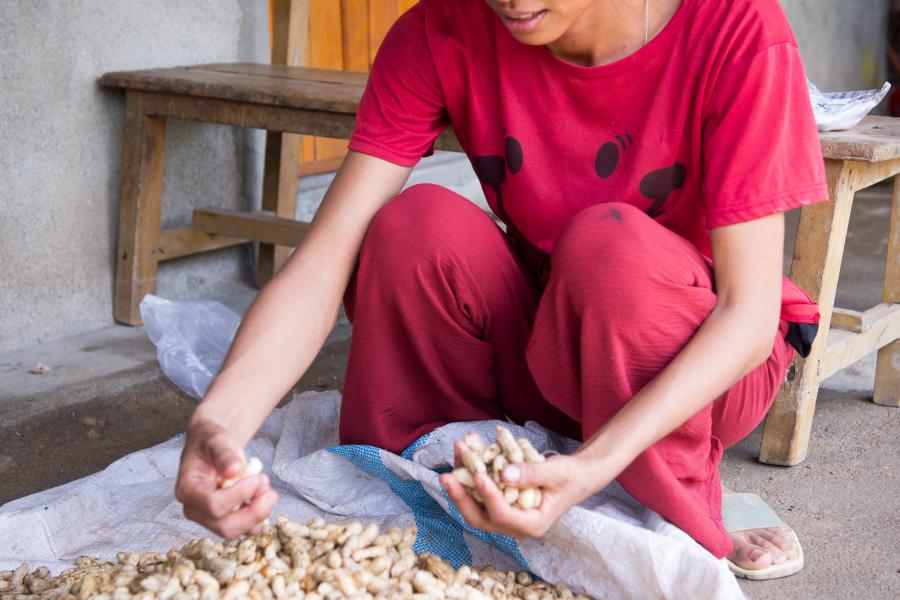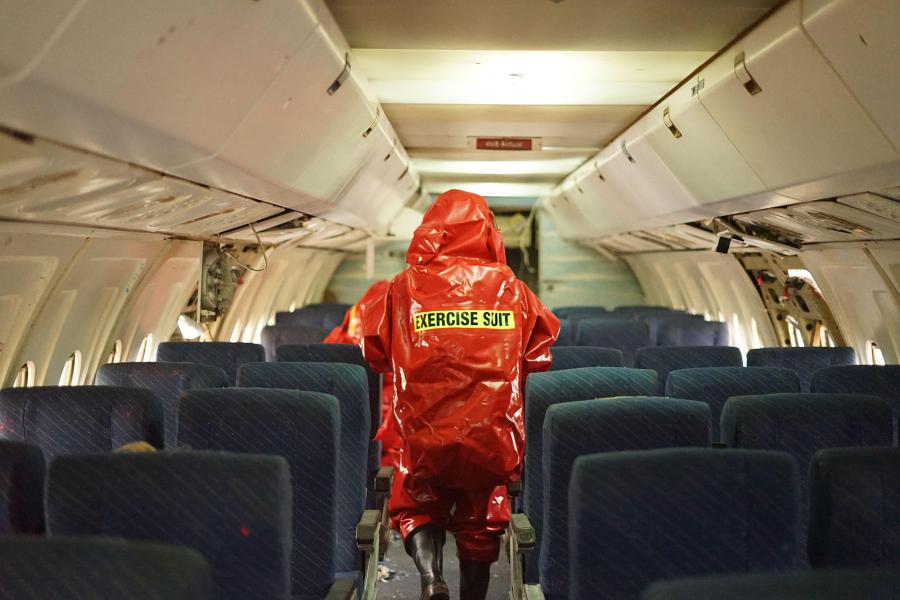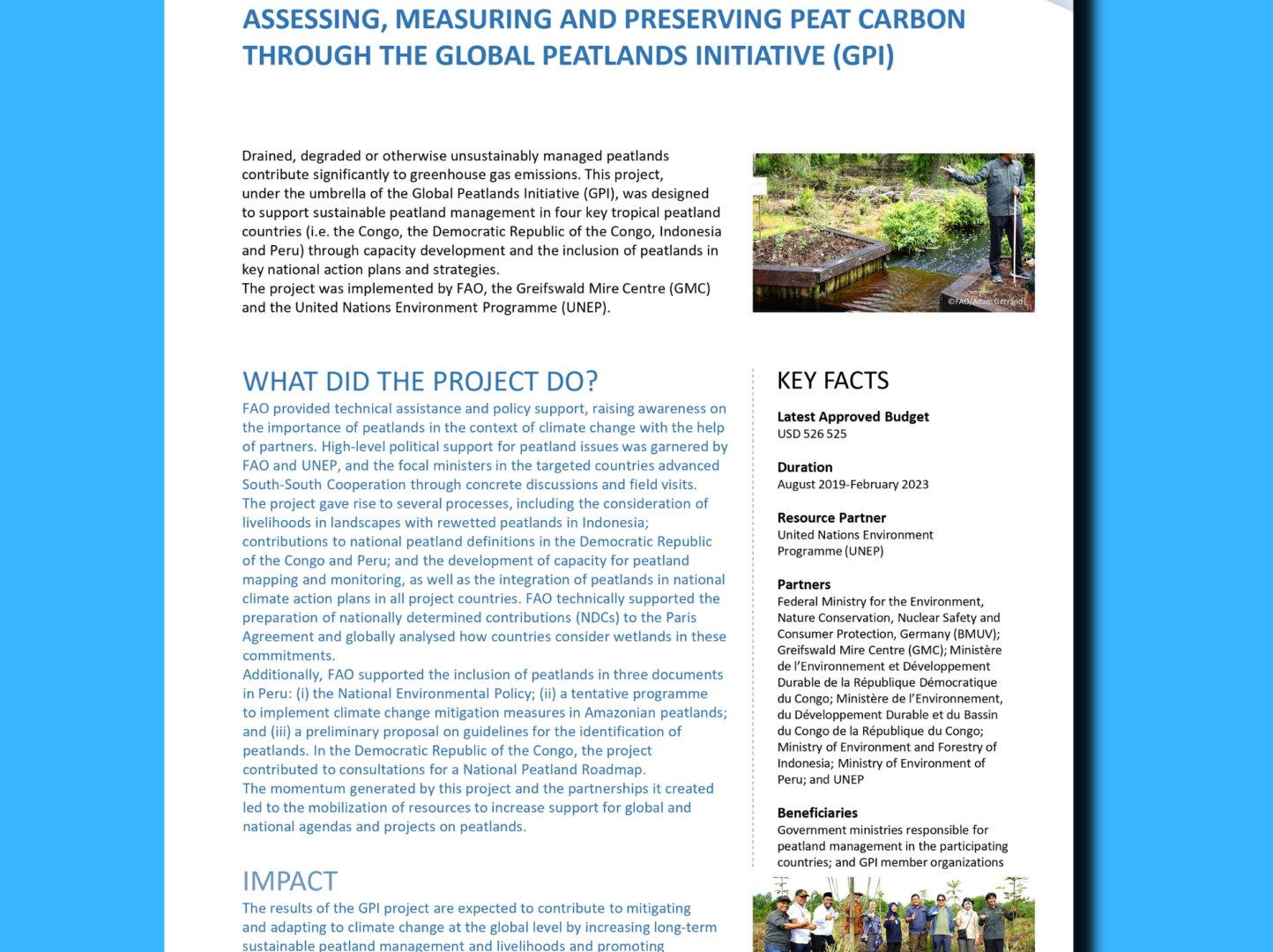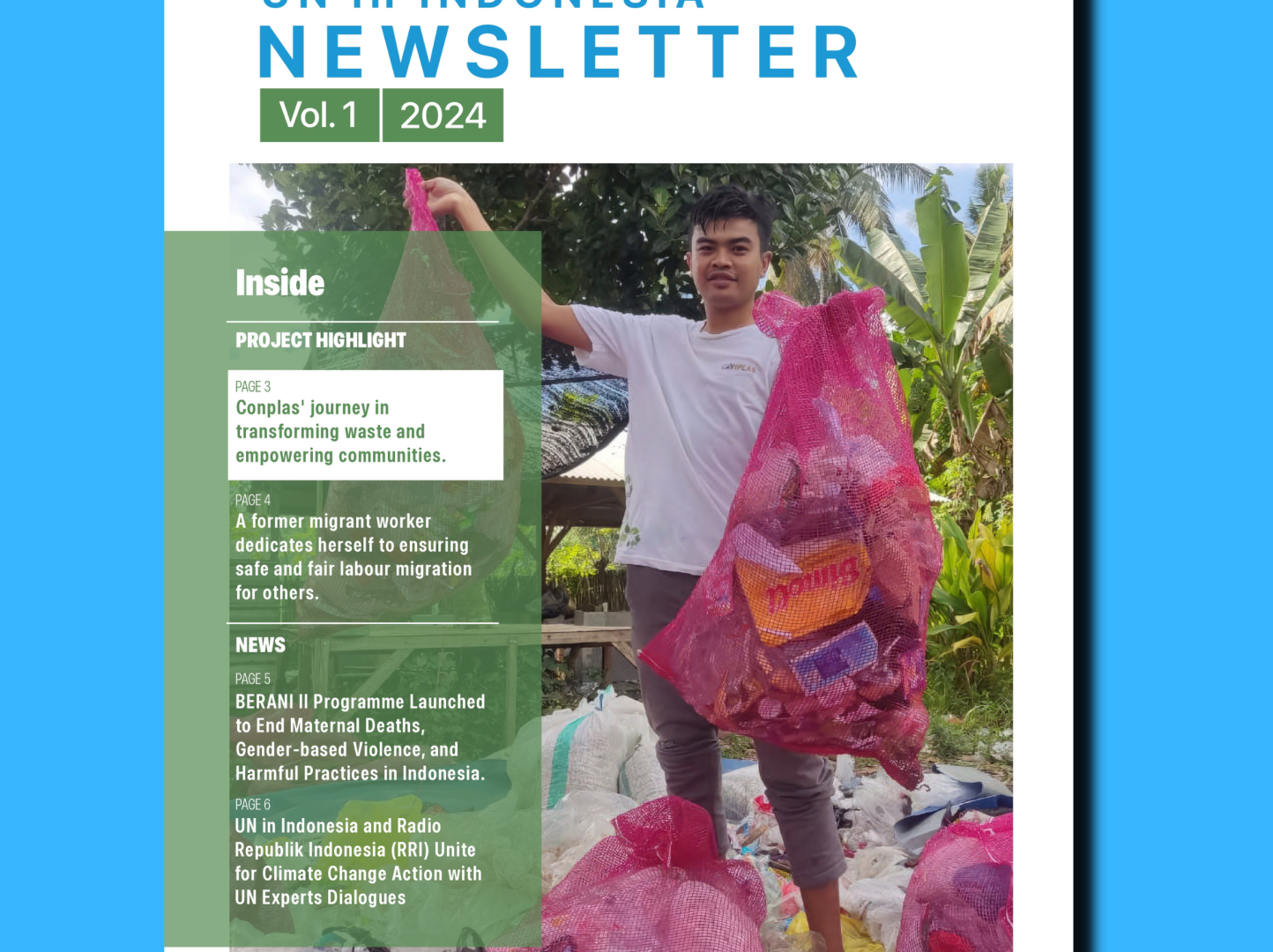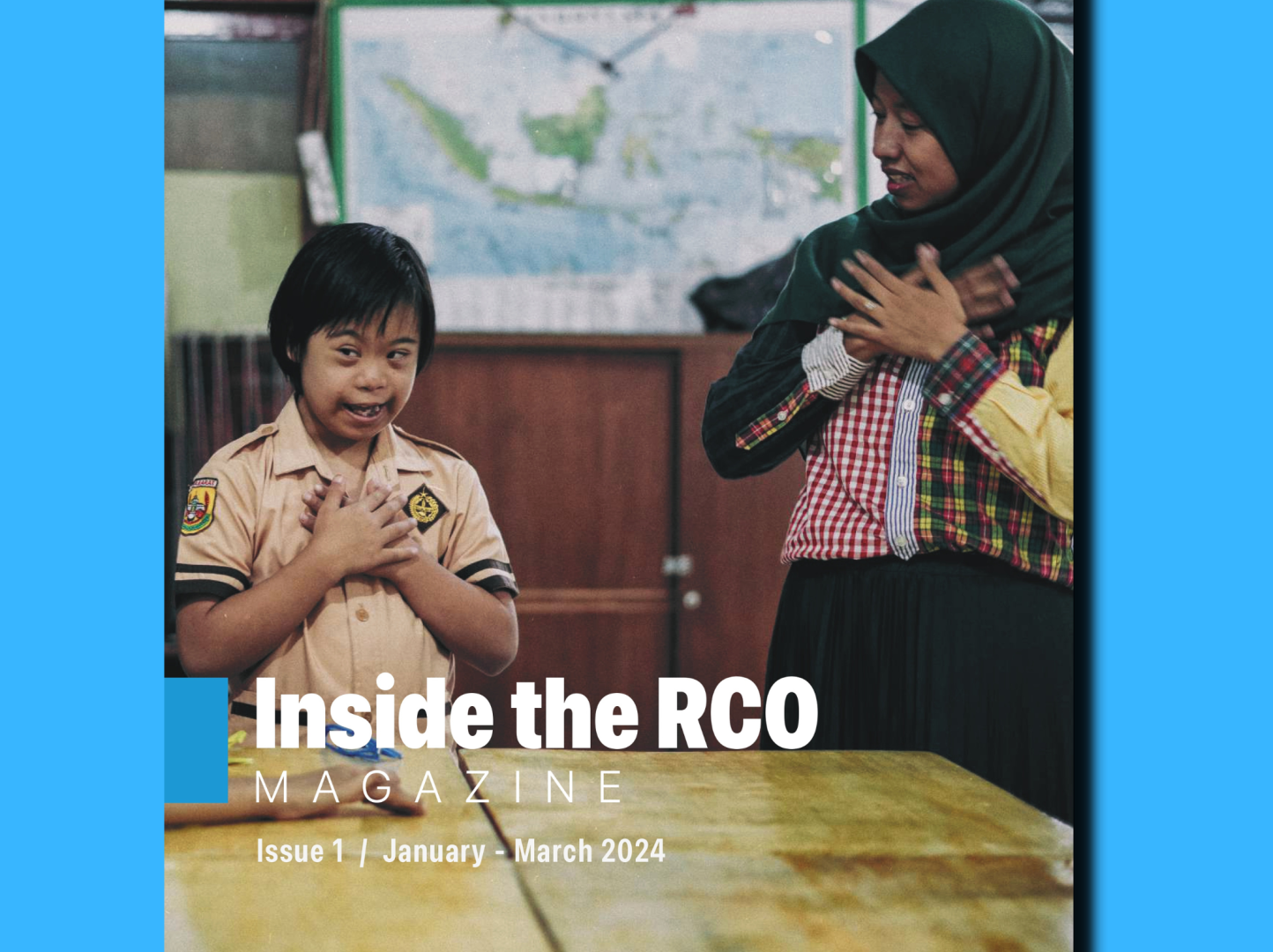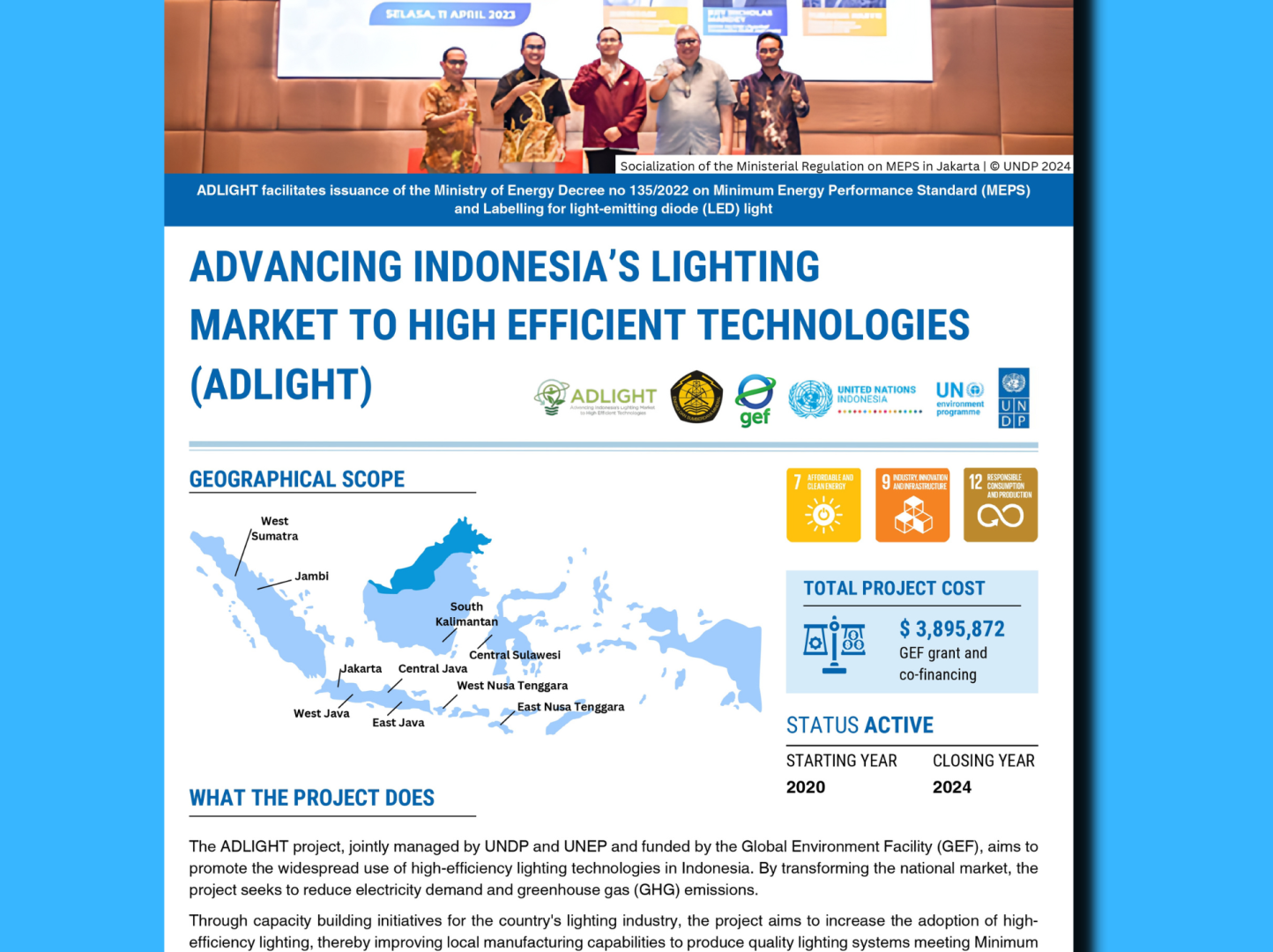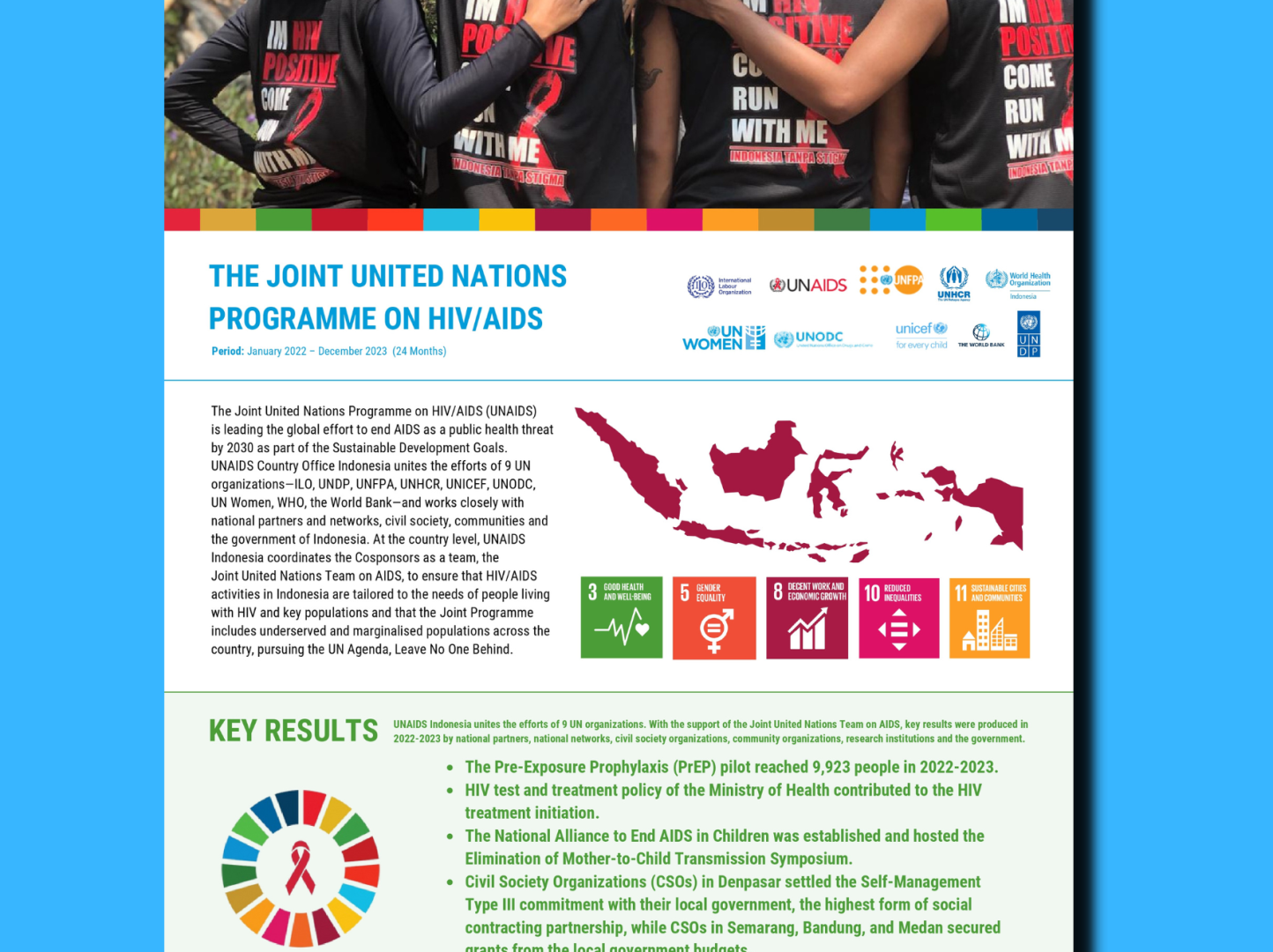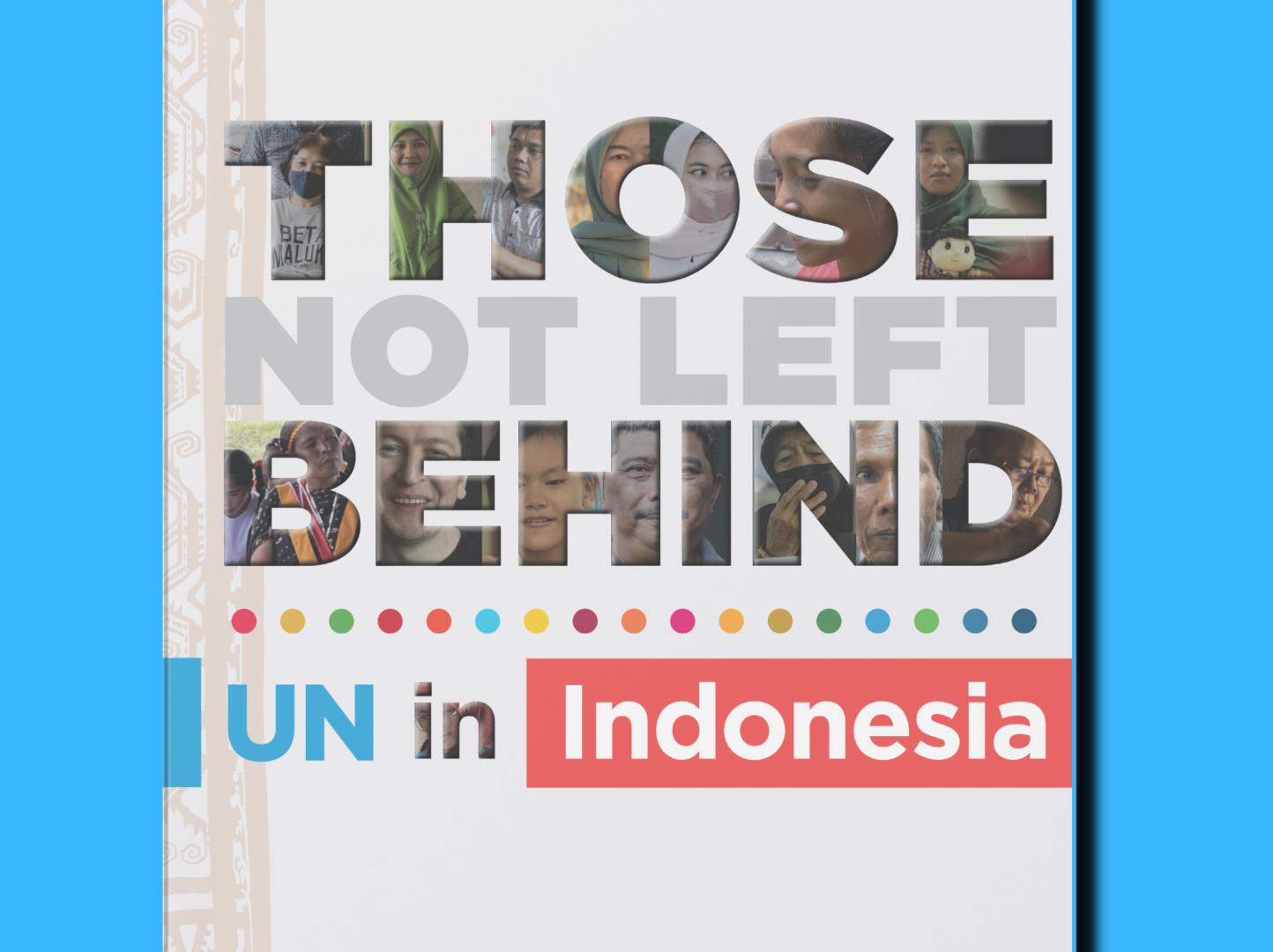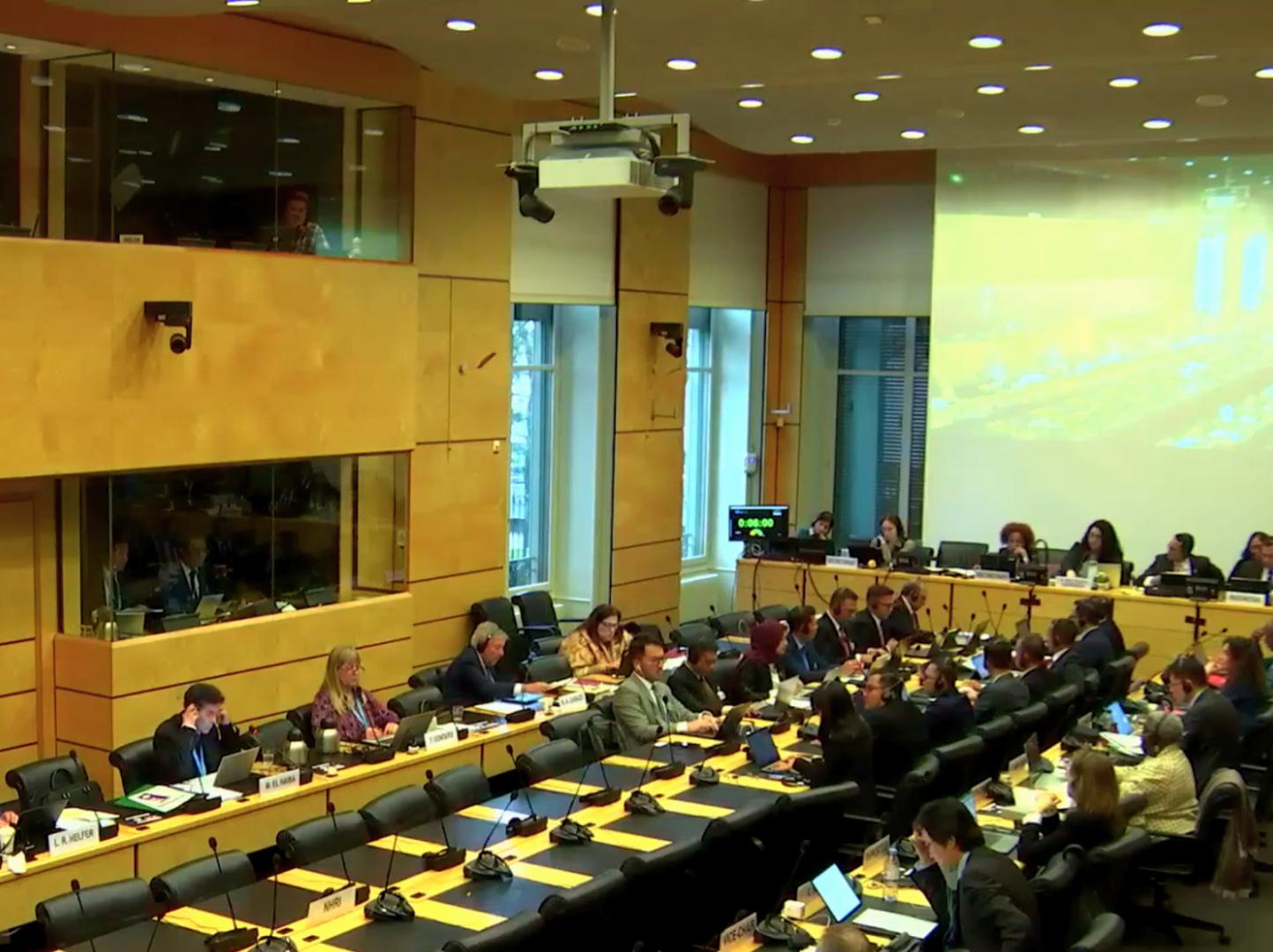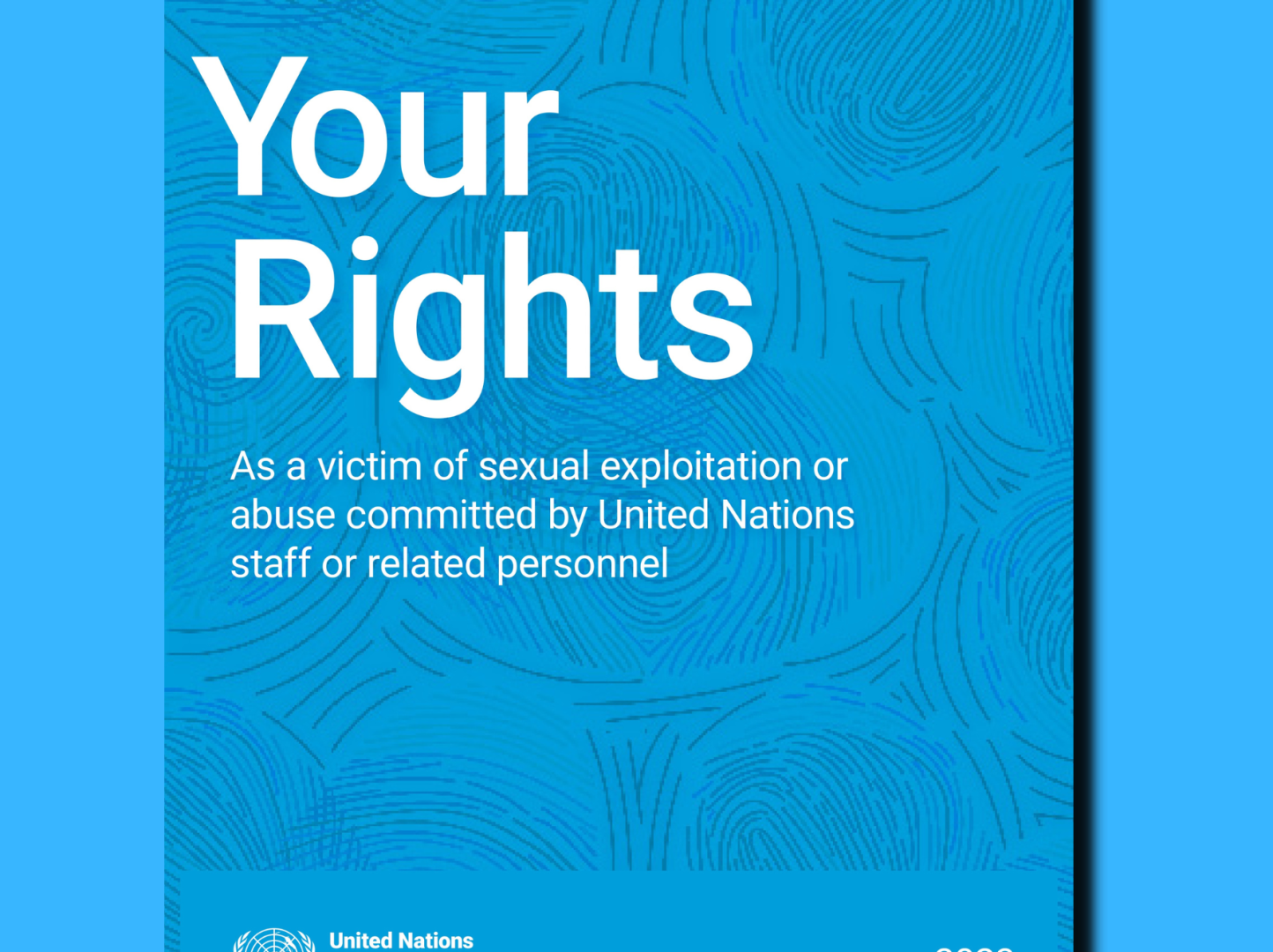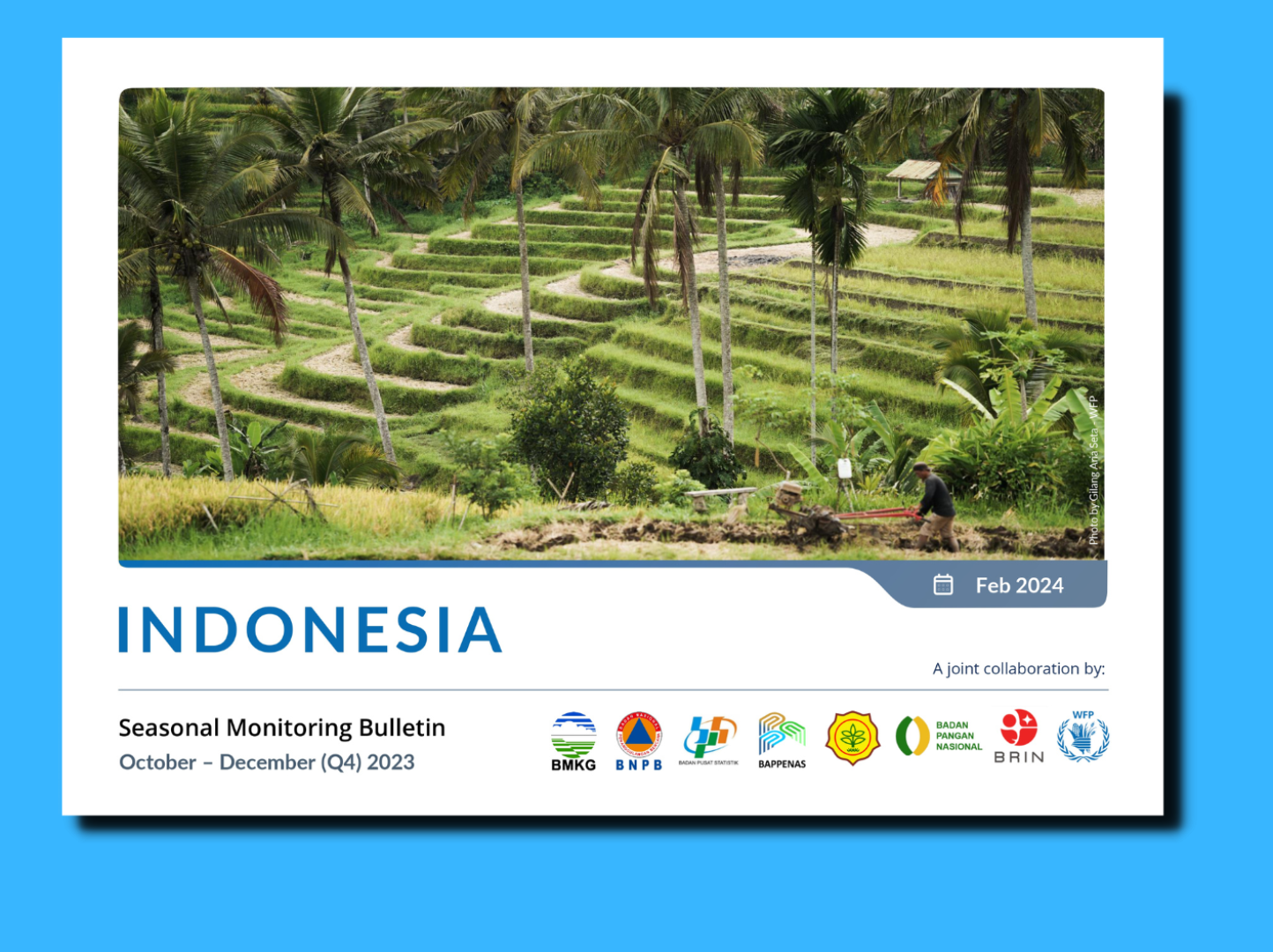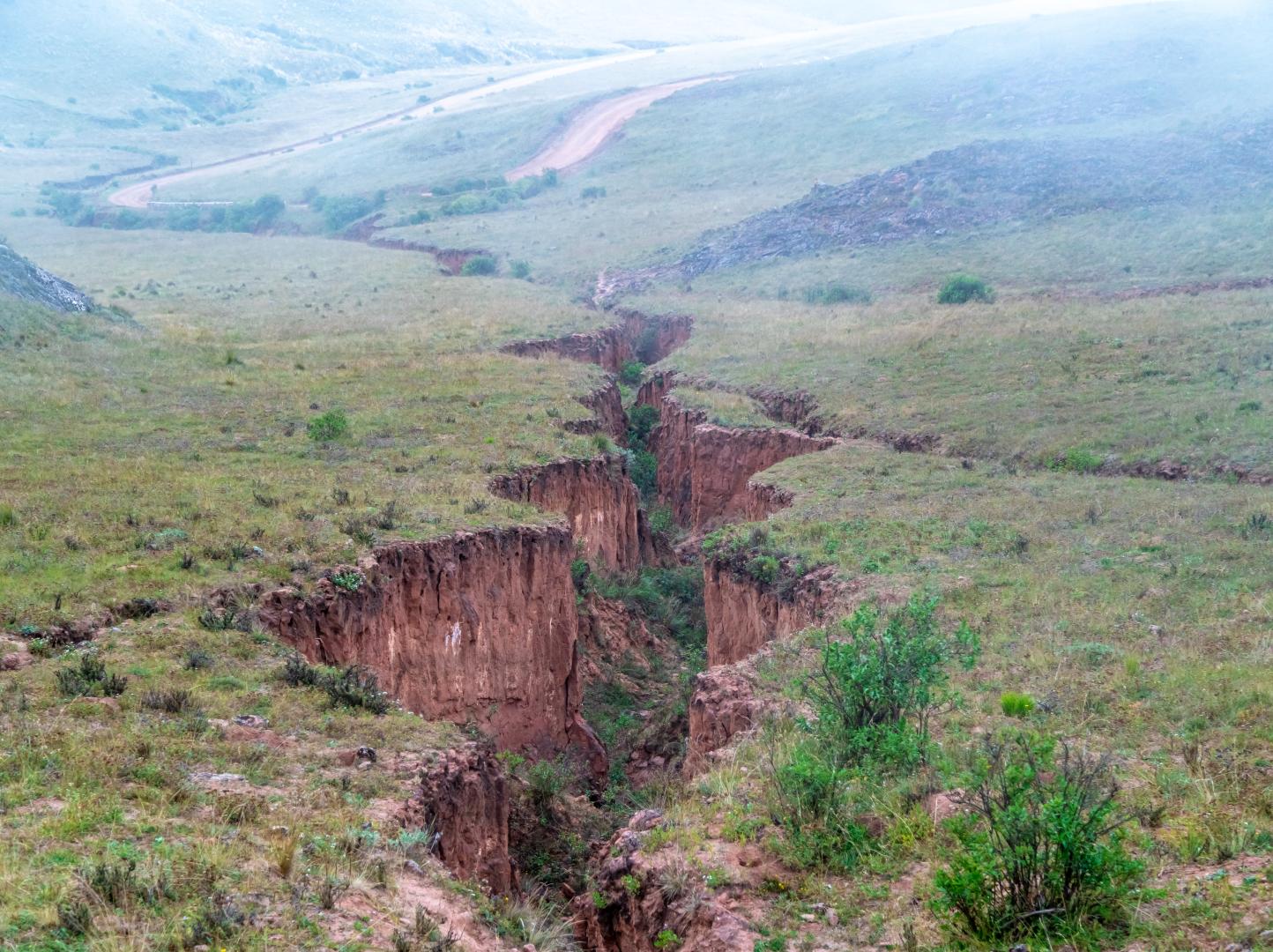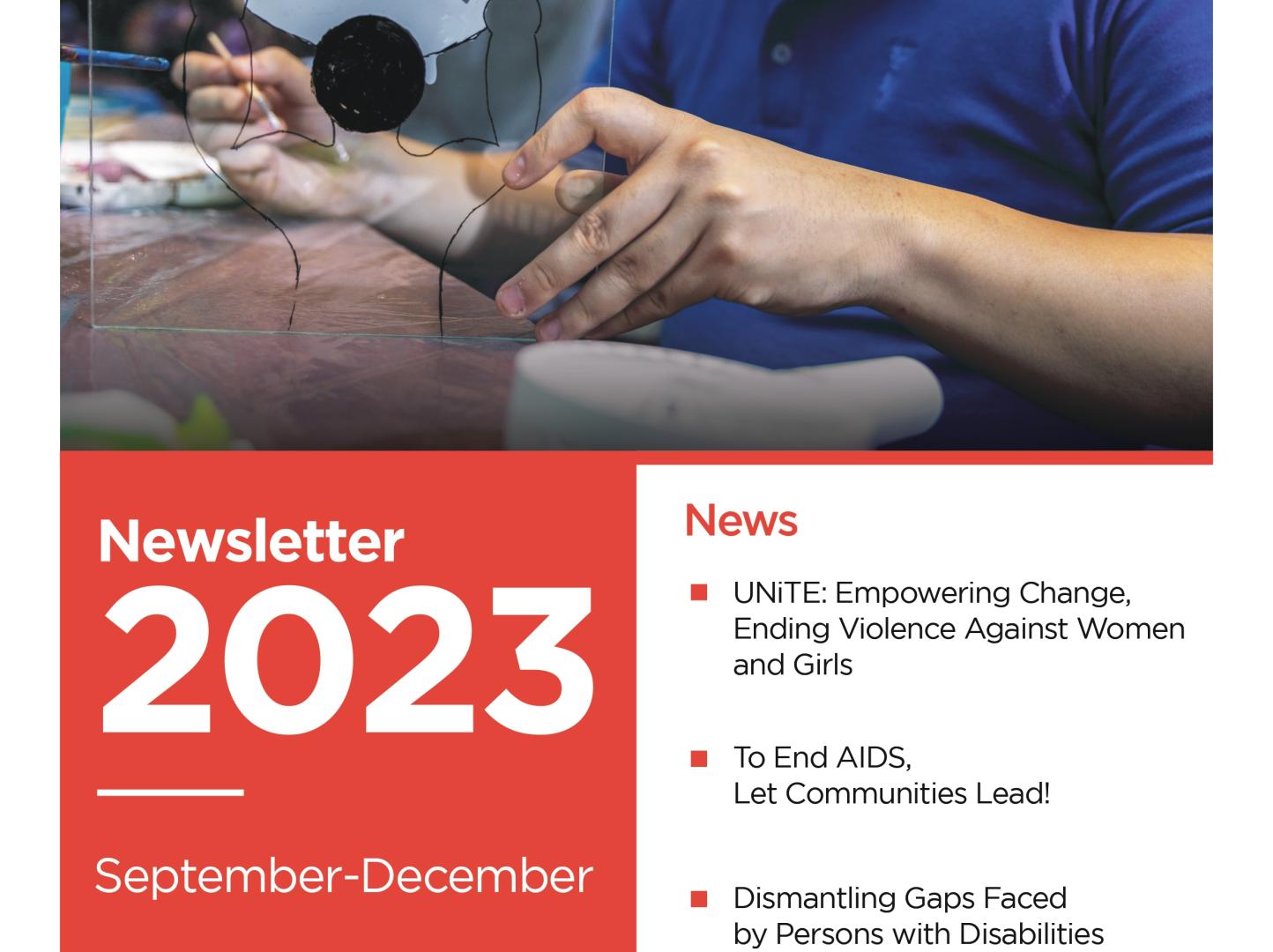Latest
Press Release
27 April 2024
IOM Indonesia Receives Hasan Wirajuda Pelindungan WNI Award for its Assistance and Protection of Indonesian Citizens
Learn more
Press Release
23 April 2024
Secretary-General appoints Gita Sabharwal of India as the United Nations Resident Coordinator in Indonesia
Learn more
Press Release
23 April 2024
Climate change and extreme weather impacts hit Asia hard
Learn more
Latest
The Sustainable Development Goals in Indonesia
The United Nations is committed to working with the Government of Indonesia to building a nation that is prosperous, democratic, and just, where development benefits all people, and where the rights of future generations are protected. True to the promise of the SDGs to “leave no one behind”, the UN’s approach combines a strong focus on the poorest of the poor, combatting discrimination and rising inequalities and addressing their root causes. “Leaving no one behind” means prioritizing people’s dignity and placing the progress of the most marginalized and vulnerable communities first. This central and transformative promise has become more important than ever to address the impacts of the COVID-19 pandemic and work towards a sustainable, resilient, and inclusive recovery.
Publication
28 June 2023
United Nations in Indonesia Country Results Report 2022
The UN in Indonesia's Annual Results Report 2022 provides a comprehensive overview of the UN's work and impact against the backdrop of a difficult economic situation both globally and to some extent also in Indonesia. The war in Ukraine, and the food, energy and financial crises in its wake were unexpected challenges for countries worldwide. Despite such headwinds, Indonesia navigated the situation better than most. The report highlights development outcomes as the country were recovering from COVID-19 while advancing the Sustainable Development Goals (SDGs) and improving the lives of citizens.
The collaborative efforts of the Government of Indonesia, international development partners, and member states are recognized as instrumental in achieving the SDGs. The report is illustrated with 30 "stories" of individuals who - thanks to projects by various UN agencies - are no longer left behind. For detailed insights into the UN's work and the country's progress, please download the full report attached.
1 of 5
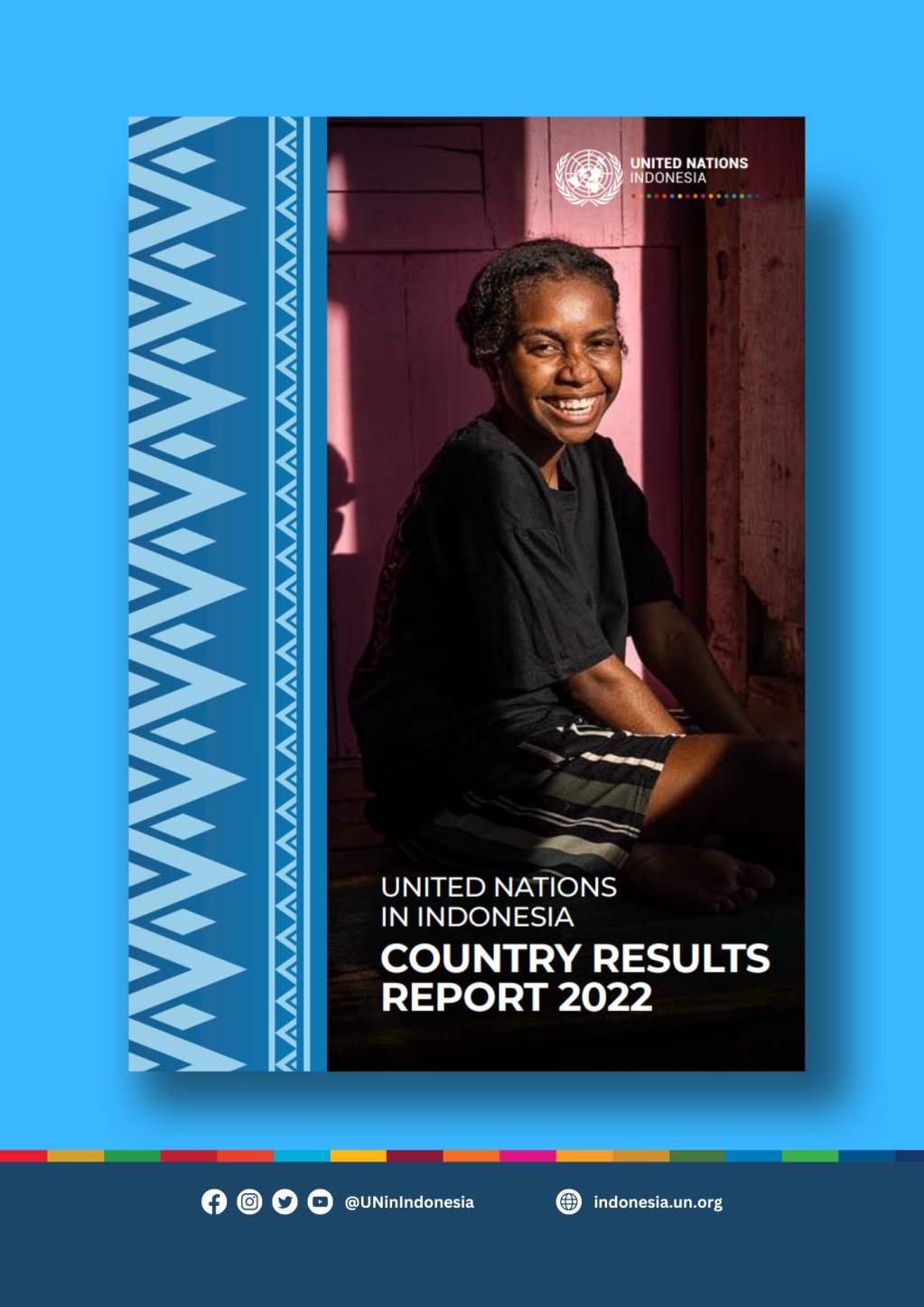
Publication
07 June 2023
Better Sexual and Reproductive Health and Rights for All in Indonesia (BERANI) Programme Fact Sheet
The Government of Indonesia, UNFPA, and UNICEF have been working together through the Better Sexual and Reproductive Health and Rights for All in Indonesia (BERANI) Programme from 2018 to 2023. This joint effort aims to improve sexual and reproductive health and rights for women and young people across the country.
Under the BERANI Programme, several key areas have been focused on, including enhancing midwifery education and regulation, strengthening partnerships to improve family planning, providing youth-friendly sexual and reproductive health services and information, strengthening the health sector's response to gender-based violence, and community outreach and empowerment.
Throughout the programme, significant achievements have been made. Over 20 policies, advocacy strategies, and roadmaps were developed to promote sexual and reproductive health and rights. Midwifery education centers have implemented high-quality standards, leading to increased pass rates in national competency exams. Private clinics have been strengthened to provide quality youth-friendly services, and community health centers have been capacitated to respond effectively to gender-based violence.
Additionally, a considerable number of young people have benefited from the programme. Thousands of adolescents have received comprehensive sexuality education and information on menstrual hygiene management. Digital content creators have been trained to develop sexual and reproductive health-related content, reaching a combined audience of over 600,000 young people.
The BERANI Programme highlights the commitment to leaving no one behind, ensuring that all individuals, regardless of their background, have access to comprehensive sexual and reproductive health services and information. The BERANI fact sheet is downloadable through the button below this article.
#BERANI #ReproductiveHealth #GenderEquality
1 of 5
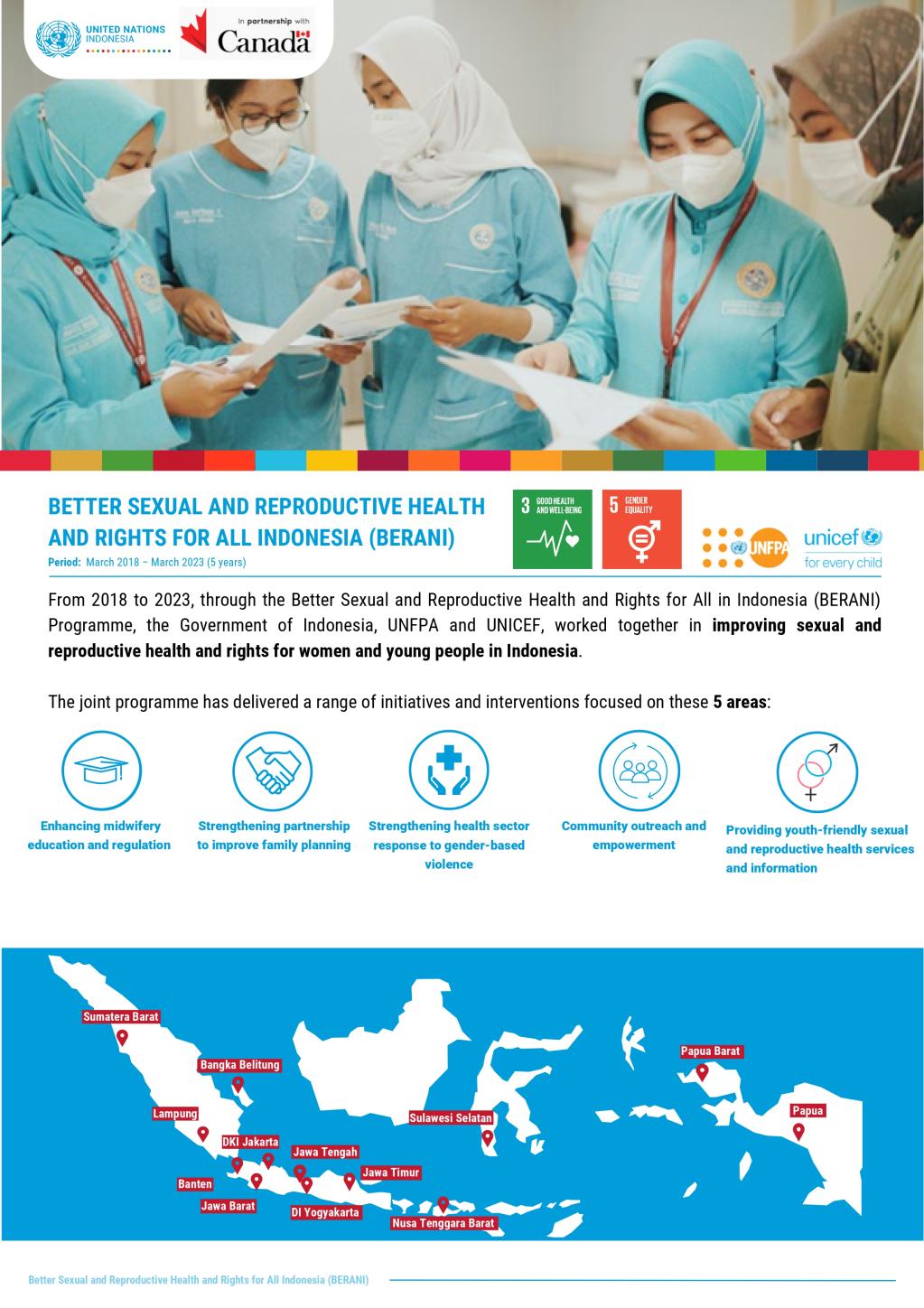
Story
29 May 2023
Baristas behind bars: From serving time to serving lattes
Perfectly foamed milk. A delicate butterfly enswirled atop. A bittersweet tang on the palate. A perfect cappuccino? It is beyond that. This particular cup was masterfully frothed and served by Denny, an inmate in Tangerang, west of Jakarta, who joined a UN-supported training programme to help prisoners to re-integrate into society after serving time.
“I want to make the most of my time, even in prison, and this training should help me find a job later,” said Denny, 31, who has just over two years left of a five-year prison sentence. “Of course, I knew how to make a coffee before, but here I am learning about different flavours, smells and aromas, and about the artistic side of coffee making.”
Denny is one of 200 inmates in the Tangerang Class IIA Correctional Facility and among more than 35,000 inmates across Indonesia who are involved in vocational training, from eco-printing on textiles to farming. While learning how to be a barista behind bars, he said he hopes to get a job in a café following his release.
Salis Farida Fitriani, who heads the correctional facility, said the programme aims at building a better future, but skills training alone is not enough for inmates to succeed in the outside world.
To deal with a society that often stigmatizes them for life, she said, the prison offers training in personality development, counselling, and religious teaching.
“Our goal is to provide positive activities and training for the inmates,” she said. “The programme includes personality development as well as vocational training to help with their future livelihoods.”
Breaking the ‘ex-con’ stigma
Starting a business is hard after serving time in prison, said Haswin, a 32-year-old former drug offender. Leaving the Tangerang correctional facility in January 2022, he now operates his own coffee shop, mixing modern and traditional coffee styles alongside mocktails and snacks.
“Life is so much better now,” said Haswin, adding that his former bartending job was a prime factor in his involvement with drug-related offences that led to his arrest in 2018.
“I am more content with life and proud of my creativity,” he explained. “I had never thought I could find a career outside nightlife.”
Now, his work is not just a “means to make ends meet”, but a new opportunity.
“I want to break the stigma around ‘ex-cons’ by showing that former offenders can also be independent and creative,” he said.
From sports to university programmes
Tangerang Class IIA gives prisoners a chance to do that. They can also compete in professional sports at Tangerang, a prison unique in Indonesia for offering a full university education programme. Open to prisoners across Indonesia, a pilot programme currently serving 200 inmates is poised to roll out countrywide, subject to funding, Ms. Fitriani said.
Asep, a third-year Islamic studies student with Syekh Yusuf Islamic University, said he, like many in the programme, could not afford to go to university in his life before prison.
“I was always keen to learn, but my economic situation did not make it possible for me to study,” he said.
Following the same curriculum the university offers to its regular students, Asep and his schoolmates attend classes thrice weekly for six hours each day. After graduation and before the end of his prison sentence, Asep said he hopes to help his fellow prisoners by offering religious counselling.
“I get to learn a lot about the world and about life outside,” he said. “It helps me cope better with my long sentence. It will help the others, too.”
Tailored to inmates’ needs
Supported by the UN Office on Drugs and Crimes (UNODC), the training programmes are designed with help from a set of assessment tools that provide evidence-based approaches tailored to inmates’ individual needs.
Corrections officers use these tools to evaluate and better understand inmates, including the level of security risk they may pose, their compatibility with the programme, and their likely response to education.
Within UNODC’s prisoner rehabilitation initiative, which focuses on education, vocational training, and employment during incarceration, the goal is to contribute to the prisoners’ employability after release, thus reducing chances of recidivism.
With this in mind, the agency partnered with Indonesia’s Directorate-General of Corrections to create an assessment matrix that helps corrections officers to build psychological and security profiles of prisoners and enables staff to keep track of their progress, said Rabby Pramudatama, a programme manager at UNODC’s Jakarta office.
“We need to make sure, for instance, that we get inmates who are unlikely to disturb the classes and will cooperate with teachers and their fellow students,” he said.
Second chances
UNODC also collaborates and supports such non-governmental organizations as Second Chance, which help inmates to reintegrate into society once they are out of the facility.
On a quiet morning, some inmates were reviewing verses from the Quran, while others gathered around to watch a pair of sparring kickboxers. As rain set in, they spoke of the sunshine that was bound to break through, sooner or later.
For Denny, he said the sunshine will come on the day when he, too, can get out and find a job.
“My main drive right now is to be a better person than I was before,” he said, adding that until that day, he will focus on religious activities and brewing perfect cappuccinos in barista classes.
Learn more about how UNODC is helping to reform prisons across the world here.
This article was initially published by UN News in this link: https://news.un.org/en/story/2023/06/1137212
1 of 5
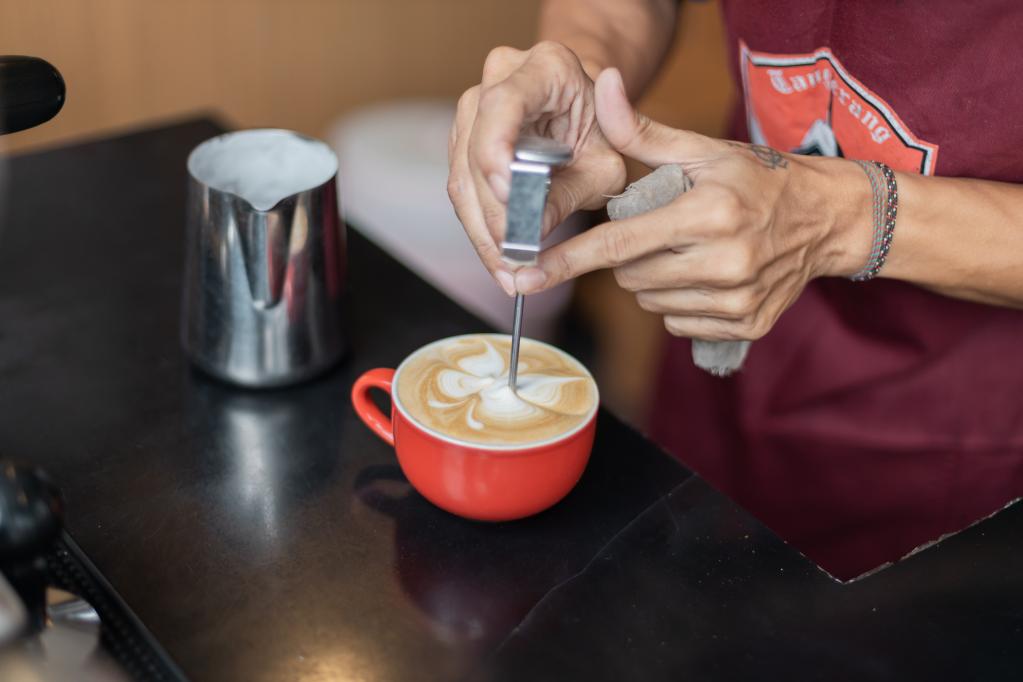
Publication
30 May 2023
UN in Indonesia Newsletter 2023 Volume 1
We are pleased to present the first edition of the UN in Indonesia Newsletter for the year 2023. This newsletter provides an overview of the significant work carried out by the United Nations in Indonesia from January to April, highlighting our commitment to sustainable development and inclusivity.
In this edition, our focus is on SDG 17: Partnerships for the Goals. By fostering strong collaborations and partnerships between governments, private sector, and civil society, we aim to accelerate progress towards achieving the Sustainable Development Goals (SDGs) and creating a better future for all.
Through the newsletter, we strive to bring the United Nations closer to the people we serve, ensuring that no one is left behind in our pursuit of sustainable development. It features inspiring stories from various UN agencies in Indonesia, showcasing their remarkable initiatives and efforts in promoting inclusivity and advancing sustainable development goals.
One of the featured projects in this edition sheds light on the vocational training program at the Tangerang Class IIA Correctional Facility. With the support of the UN Office on Drugs and Crime (UNODC), this program equips prisoners with essential skills to facilitate their successful reintegration into society after completing their sentences. It exemplifies our commitment to empowering individuals and contributing to positive social change.
As we navigate the post-pandemic era, it is imperative that we make up for the lost time and expedite our efforts towards achieving the SDGs. By strengthening our collective impact and forging new pathways, we can create a more sustainable and inclusive world for present and future generations.
You can access the downloadable newsletter in both English and Bahasa Indonesia below of this page.
Together, let us make a lasting difference and work towards a world where everyone can thrive.
1 of 5
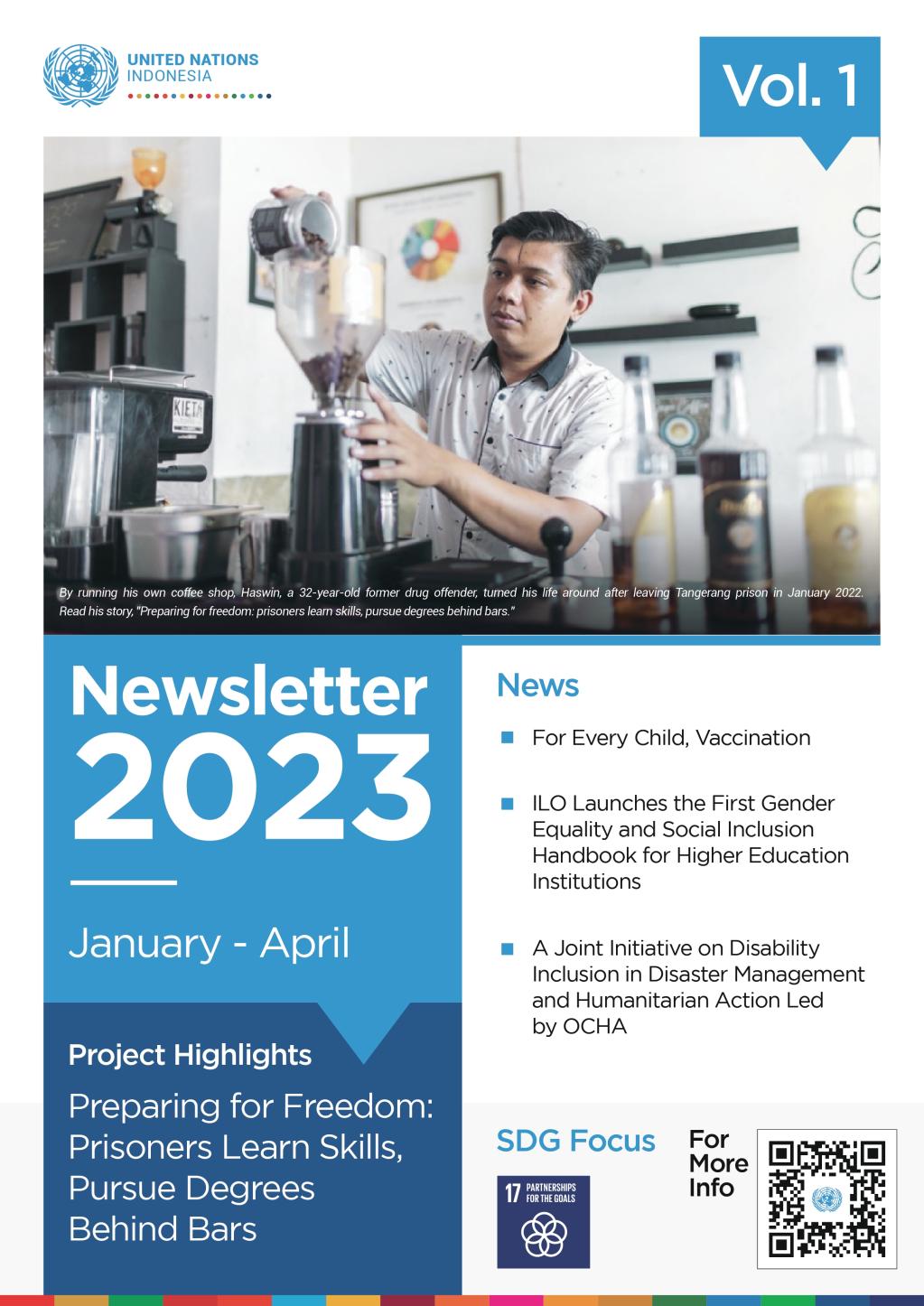
Take Action
05 May 2023
Nakba Day
This year marks the 75th anniversary of the mass displacement of Palestinians, known as “the Nakba” or “the Catastrophe”. This anniversary puts the spotlight on the world’s longest-standing protracted refugee crisis, as over 5.3 M Palestine refugees still live amidst conflict.
1 of 5
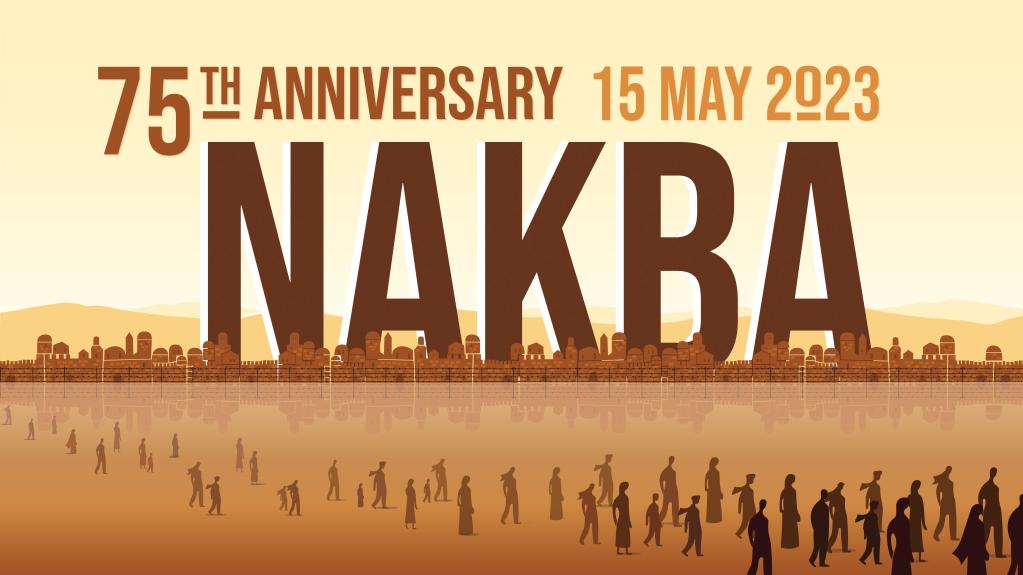
Story
19 March 2024
Illuminating Integrity Fighting Corruption: Messages from AKPOL Cadets Winning International Essay Competition
Semarang, Indonesia - To instill the value of integrity in the younger generation of law enforcers, the United Nations Office on Drugs and Crime (UNODC) synergized with the Indonesian Police Academy (AKPOL) to hold an award ceremony for the winners of an international essay competition that focused on police integrity. This event, which was held on March 4, 2024, was not just an appreciation event, but rather a manifestation of a shared commitment to creating an ethical and responsible police force.Amid emotion and pride, four Police Academy cadets, Helena Fiorentina, Tesalonika, John Anderson Batara Aryasena, and Theodore Gomgom Octofarrel, emerged as representatives of the competition winners. They shared their impressions, messages, and hopes about the importance of integrity in law enforcement.Helena Fiorentina: Youths' Voice Against Corruption As a level 4 cadet, Helena feels honored and responsible to be part of the movement against corruption. "My essay has the theme of corruption as Indonesia's biggest enemy. I want this essay to be the voice of youth, encouraging my generation to dare to speak and act against corruption," she said. Her success in winning first place was not only a personal victory, but a symbol of the potential of youth in building national integrity.Tesalonika: Strengthening the Integrity of the National Police Tesalonika, also a level 4 cadet, took the title of an essay that invited all elements of society and the police to work together to build integrity. "Cooperation between the community and the police is important to create an anti-corruption culture," said Tesalonika. Through her essay, she wants to show that positive change starts from strengthening the basics of the police, protecting, protecting, and serving the community with integrity.John Anderson Batara Aryasena: Synergy between Community and Police John Anderson, cadet 2, was inspired by the dynamics of society in viewing corruption. His essay aims to highlight the role of synergy between the community and the police in preventing corruption. "Corruption is not only a matter of the integrity of the authorities, but also about the needs of the people who enable it. We need to work together to build awareness and work together to fight it," explained John Anderson.Theodore Gomgom Octofarrel: Youths' Aspirations in Fighting Corruption Gomgom, a level 4 cadet, expressed his gratitude for being able to express his aspirations through this competition. "The title of my essay, 'Evicting the Bastards from Red and White', shows how corruption has harmed our country. I hope that, through this competition, more young people will be inspired to have integrity and fight against corruption," said Gomgom.Inspirational stories from Helena, Tesalonika, John Anderson, and Gomgom are clear evidence that Indonesian youth are ready to become pioneers of change. The awards ceremony, which was attended by UNODC and Police Academy leaders, was an important moment in the history of police education in Indonesia, underscoring the importance of ethical values and integrity for future law enforcement officers.Lighting the Path to Integrity"The journey towards integrity is not always easy, but this award is proof that every step we take matters. Let us continue to keep the fire of integrity burning in every action, for the sake of a better future," said Erik Van Der Veen, Head of the UNODC Office and Liaison for ASEAN.Inspector General of Police Krisno H. Siregar, S.I.K., M.H., Governor of the Police Academy, closed with a message of hope, "Thank you to UNODC and all those involved in this competition. Let us continue to build strength of character and integrity among law enforcement officers, ensuring that Indonesia moves forward with a strong and ethical foundation."While these four outstanding cadets enjoyed their awards, their message was clear: integrity is not just words, but real actions that must be carried out together in creating a better Indonesia. This is the beginning of a long journey in building public trust and upholding justice.Also read: UNODC and AKPOL Celebrate Cadets as Winners of International Essay Competition on Police Integrity
1 of 5
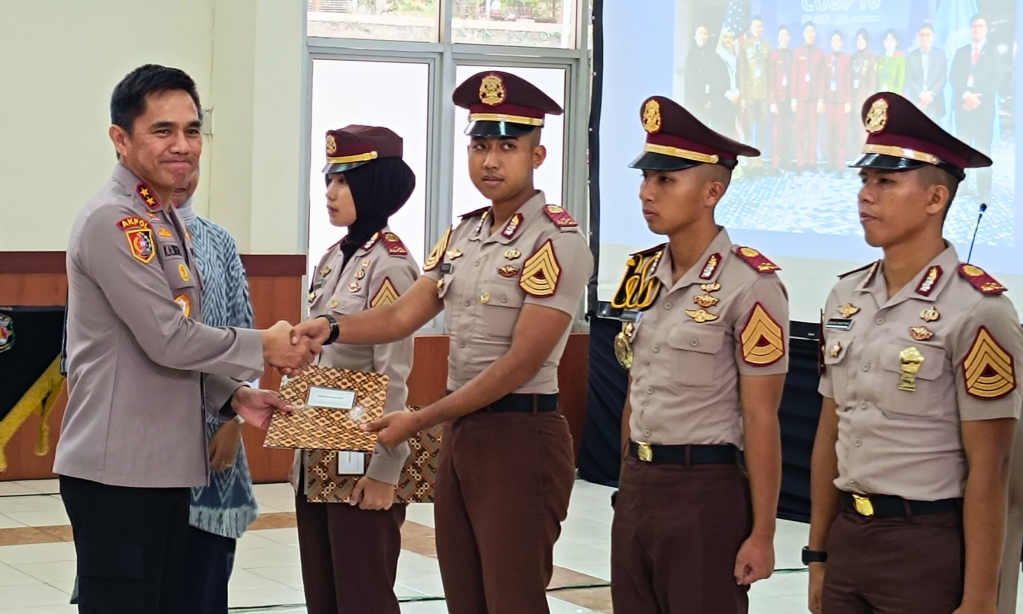
Story
19 March 2024
UNODC and AKPOL Celebrate Cadets as Winners of International Essay Competition on Police Integrity
Semarang, Indonesia - The United Nations Office on Drugs and Crime (UNODC), in a collaboration with the Indonesian Police Academy (AkPol), has taken a significant step forward in fostering integrity among future law enforcement officers. On March 4, 2024, the Akademi Kepolisian Semarang became the venue for an important event, the Courtesy Call and Award Ceremony for the UNODC Essay Competition on Police Integrity. This event not only highlighted the shared commitment of UNODC and Akpol to ethical policing but also showcased the remarkable talents of police cadets who are prepared to lead by example. The day began with a formal courtesy call at the Lounge Tri Brata Utama, where officials from both organizations came together. Participants included the Governor and Deputy Governor of Akpol, along with key directors and department heads, and representatives from the UNODC Indonesia Office. This gathering was dedicated to celebrating the integrity and accountability within the Indonesian police force. "We extend our gratitude for providing our cadets with the invaluable opportunity to engage in this critical competition focused on anti-corruption. This initiative is important, laying down a robust foundation for nurturing future leaders who are not just aware of the challenges of corruption but are also equipped to tackle them head-on. It prepares them to spearhead Indonesia's journey towards achieving its zenith of prosperity by 2045.” Said Inspector General of Police Krisno H. Siregar, S.I.K., M.H., Governor of the Police Academy, in his speech. He added, “Such initiative underscores our dedication to enable an environment at the academy and within the nation that is rooted in integrity, professionalism, and exceptionalism, ensuring that our future leaders are well-prepared to navigate and lead in complex environments." The Award Ceremony unfolded at the Gedung Manunggal, starting with the Indonesian national anthem, followed by an invocation. The ceremony was addressed by the Akpol Governor and the Head of the UNODC Indonesia Office, both underscoring the critical role of ethics in law enforcement. The focal point of the event was the presentation of awards to the essay competition winners, led by Helena Fiorentina, Ilham Muhammad Dzaki, and John Anderson Batara Aryasena, who emerged as the top honorees for their insightful explorations into police integrity. The ceremony further acknowledged the top ten finalists, with certificates and Sustainable Development Goals pins, emblematic of their commitment to global ethical standards and justice. The top 10 winners and finalists are: 1st place winner - Helena Fiorentina 2nd place winner - Ilham Muhammad Dzaki 3rd place winner - John Anderson Batara Aryasena 4th place - Ferditho Alehandro Simatupang Rank 5 - Brian Velino Adinata Rank 6 - Andreanitha Elsye Pattinasarany Rank 7 - Ansyah Bhakti Satyabharda Rank 8 - Theodore Gomgom Octofarrel Rank 9 - I Wayan Nugraha Satya Ananda Rank 10 - Tesalonika "I wish to express my deepest admiration and gratitude to the organizers, participants, and winners of this insightful essay competition. Your collective dedication to exploring and advocating for integrity within law enforcement is not only commendable but essential for the progress of our societies. As future pillars of justice and guardians of public trust, your journey is marked by the principles of integrity, fairness, and ethical conduct you've so eloquently discussed. Let this event be a reminder of our shared commitment to uphold these values in every action we take and decision we make. I encourage you to revisit your essays and the ideals they embody regularly, allowing them to guide and inspire you through the challenges ahead. Remember, our ultimate aim is to serve and protect the citizens, with a special focus on those most in need of our support and protection. Together, with optimism and a steadfast commitment to integrity, we can foster a more just, equitable, and inclusive future for all." Said Erik Van Der Veen, Head of Office and UNODC Liaison to ASEAN. This award ceremony stems from a broader initiative to promote ethics and integrity among police cadets in Southeast Asia. The UNODC has been organizing trainings and workshops on these subjects, culminating in an essay competition across Thailand, Indonesia, Vietnam, and the Philippines. The competition, receiving 62 entries, aimed to deepen cadets' understanding of corruption prevention, integrity, and ethical policing frameworks. The event on March 4 served not only as a platform to recognize individual achievements but also as an affirmation of the ongoing partnership between UNODC and police academies in nurturing a culture of integrity within law enforcement agencies. Looking ahead, the collaboration between UNODC and the Indonesian Police Academy signifies a continued dedication to enhancing the moral compass of future law enforcement officers. As these young cadets embark on their careers, the lessons learned and the recognition received promise to influence positively the landscape of policing in Indonesia and beyond. Also read: Illuminating Integrity Fighting Corruption: Messages from AKPOL Cadets Winning International Essay Competition
1 of 5
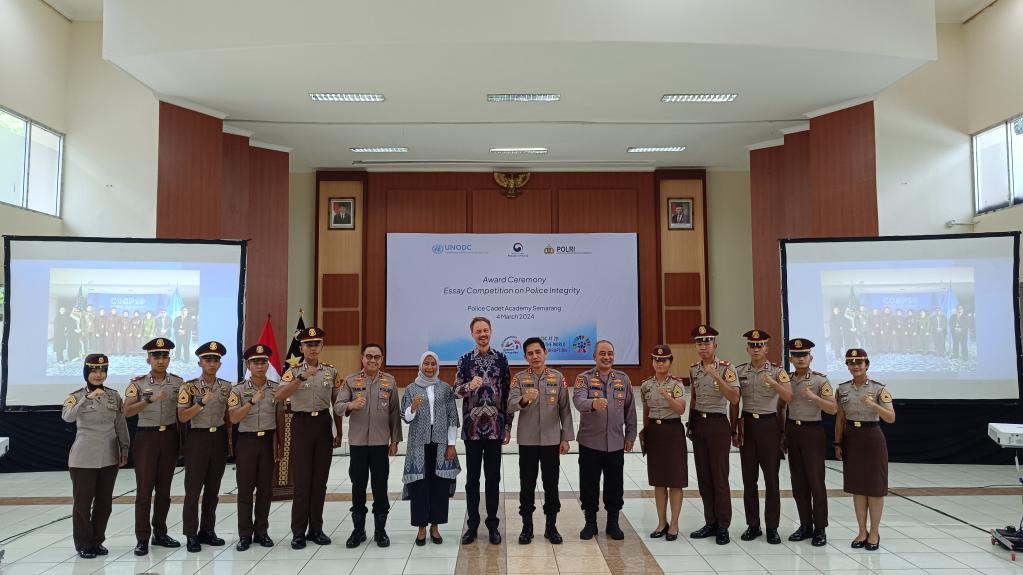
Story
13 March 2024
Chemical terrorism: Indonesia tests its response to the threat
Semarang (Indonesia), 18 March 2024 - On a seemingly typical day in Semarang, a few train passengers have started to feel nauseous. Others nearby are saying they cannot breathe. Five have fainted. One is not responding. A few minutes in, a miniature car wheezes by them, followed by a group of people dressed in full astronaut-like orange suits. They’re looking for bombs. This is what a fictional chemical terrorist attack simulation exercise looks like. “The threat of chemical terrorism is real,” said Niki Esse de Lang, UNODC’s regional counter-terrorism coordinator for Southeast Asia and the Pacific. “To counter it, we need a solid, integrated response by all relevant actors.”Indonesia is testing its capacity to respond to such threats through simulations like this one, which bring together representatives from government agencies and the private sector. So far, two have taken place in Semarang over the past months, jointly organized by the United Nations Office on Drugs and Crime (UNODC) and the National Counter Terrorism Agency (BNPT) of Indonesia, with the support of Indonesia’s National Police – Mobile Brigade (Brimob-Polri). A very real threatSince 2011, at least eight chemical terrorism incidents have taken place in Indonesia. Terrorist groups operating internationally, meanwhile, including Al-Qaeda and Da’esh (also known as ISIL) - have used chemical weapons in Iraq and in Syria. In 1995, the toxic chemical compound sarin was used in the Tokyo subway in Japan by members of the Aum Shinrikyo movement, killing 15 people immediately and injuring over a thousand more.The same chemicals used in legitimate industries, such as mining, agriculture or pharmaceuticals, can also be used by terrorists. Chlorine, for example, commonly used in water treatment facilities, can also produce a chemical weapon. This complex threat requires strong cooperation between governments and the private sector on the national, regional and international level.Preparing against the threatOutside the train, more people in protective equipment have arrived. The scene is busy: some are establishing a control area, others are setting up decontamination stations, and others are providing medical aid.A few are opening tactical laptops and equipment to measure the air and potentially contaminated surfaces, while others are drawing perimeters on the floor — red, yellow and green, depending on the contamination levels detected. A miniature car with a sensor and a camera is circulating everywhere, taking samples and helping experts outside the perimeter determine toxicity levels. Nearby, a team dressed in yellow suits is being sprayed by colleagues before breaking out carefully from the thick suits. These responders belong to different units and agencies: the police, the military, counter-terrorism, bomb disposal, forensics, medical, fire department and public infrastructure security. “This training is necessary because of the threat of this type of terrorism,” said Edi Suranta Sinulingga, Commander of the Chemical, Biological, Radiological and Nuclear Unit within the Gegana Mobile Brigade of the Indonesia National Police. “Increasingly, there have been cases in Indonesia. So all stakeholders — not only the security forces — must prepare themselves to anticipate such acts of terrorism.” Each ministry, institution or agency has different procedures or ways to respond. During the workshops, experts learned about and shared each of these mandates, frameworks, concepts of operation and standard operating procedures, as well as technical and operational capacities they can draw from. “A highly coordinated response to such a complex attack needs strong inter-agency collaboration,” said Niels den Hollander, terrorism prevention expert at UNODC. “One entity alone cannot do this.”An earlier simulation in summer last year took place on a plane. This one involved more complex elements, such as fictional perpetrators in gas masks carrying guns, suspicious hazardous material, hostages in an airport and explosions that produced real smoke on the exercise grounds.“As medical personnel, this training is of immense value. We need to adhere to strict safety protocols before we enter contaminated zones to help the victims. If we don’t, we can then become victims ourselves. And what happens then, when no medical help is available?” a medical respondents from Kariadi Hospital in Semarang said.More specialized sessions are planned to take place in 2024. These will focus on crime scene management for first responders to ensure that they know how to record and collect evidence from the scene correctly so that it can be admitted in criminal proceedings.“By bringing these agencies together for exercises, we facilitate a process by which experts feel comfortable making mistakes, learning from them, identifying gaps and developing programmes to remediate them,” said Dimas Andianto, Programme officer at UNODC. “After all, it’s a lot easier to deal with and learn from a mistake in an exercise than it is in real life.”This article was first published at the United Nations Office on Drugs and Crime (UNODC) site through this link: Chemical terrorism: Indonesia tests its response to the threat (https://www.unodc.org/roseap/en/indonesia/2024/03/chemical-terrorism/story.html)
1 of 5
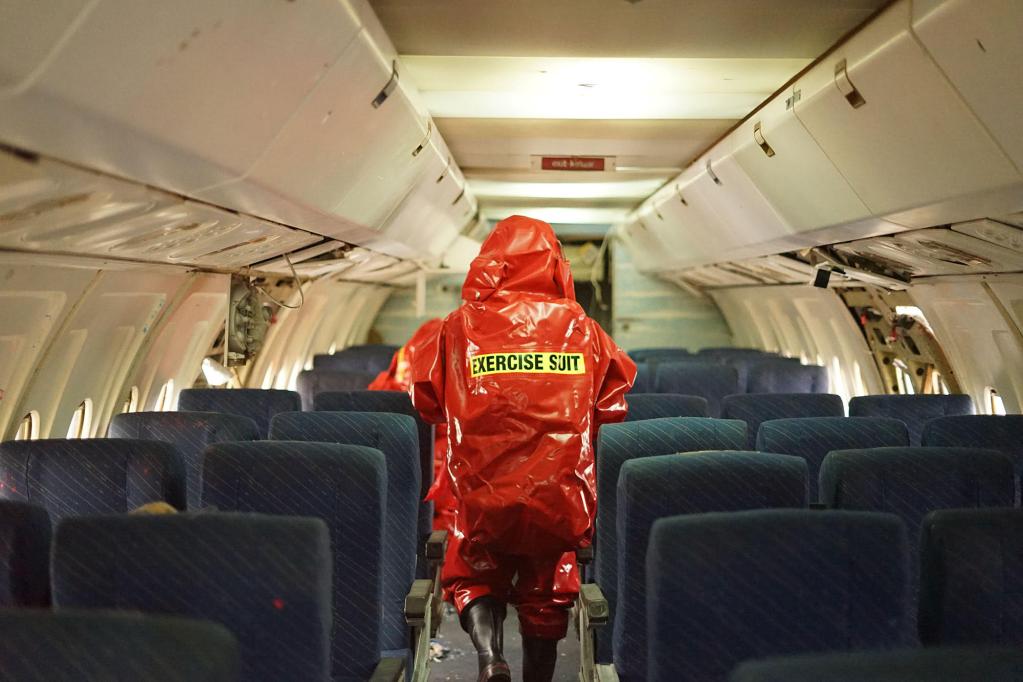
Story
29 February 2024
Increase Seaweed Production, Menko Marves: Huge Potential for Downstreaming
Marves - Lombok Timur, Seaweed is one of Indonesia’s leading commodities that has great benefits for the economy, community welfare, especially in coastal areas, and the environment. Coordinating Minister for Maritime Affairs and Investment (Menko Marves), Luhut B. Pandjaitan, said that the potential for downstream is huge.“From seaweed, we can produce bio stimulants or organic fertilizer that can help with the fertilizer subsidy issue and food security. Biodegradable plastics can solve Indonesia’s plastic waste problem. Food ingredients, such as wheat substitutes in noodles, can reduce wheat imports. Biofuel that can reduce dependence on fossil fuels, and much more,” explained Minister Luhut in his remarks at the “Showcase Piloting Budidaya Rumput Laut Skala Besar” in Ekas Bay, East Lombok, West Nusa Tenggara.Indonesia itself also has a natural advantage as a seaweed producer because it is in the equatorial region where the sun shines all year round, so seaweed cultivation can be done throughout the year. In addition, Indonesian waters are relatively calm, and there are no typhoons or tornadoes that can damage seaweed cultivation.More than 70% of Indonesia’s area is sea, with 12 million hectares allocated for cultivation. However, despite all its advantages, Indonesia’s seaweed production is still not optimal. Minister Luhut explained that currently seaweed cultivation only reaches 102 thousand hectares or 0.8% of it. More than 60% of seaweed exports are still in the form of raw or dried seaweed, with limited downstream.“To be able to downstream, one of the key things that must be done is improvement at the upstream side. Just like agriculture on land, the productivity and efficiency of seaweed cultivation must be continuously improved. Today we see that the target of increasing productivity is not impossible to achieve. Through the work of our nation’s children, various innovations such as mechanization and the use of technology are being done to increase productivity on a large scale,” explained Minister Luhut.Through large-scale cultivation covering 100 hectares with mechanization and technology, many economic benefits can be achieved, namely an investment of USD 2-2.5 million, the creation of direct employment for 100-150 people, production of 10-15 thousand tons of fresh seaweed per year, and equivalent bio stimulant production that can cover 1-2 million hectares of agricultural land.“It’s not just Lombok fishermen who will benefit but fishermen everywhere will benefit. I convey that around 100 hectares are already operational, not just trial and error. We want this technology to develop because it will create jobs for 1 million people and reduce poverty, as well as have an impact on coastal communities to develop further,” added Minister Luhut.The government will accelerate the comprehensive and measured development of the maritime industry. In this pilot project, we collaborate with BRIN, the Ministry of Marine Affairs and Fisheries, Sea6, Prospera, MTCRC, Conservation Indonesia, and Universitas Mataram to evaluate the impact of this project on the social-economic conditions of the community, water equality, environmental ecosystems, and carbon absorption potential.“In this way, we will obtain accurate data for future policy improvements. Various programs will be implemented to support integrated acceleration both upstream and downstream,” explained Minister Luhut.The acceleration of the seaweed industry involves other ministries and institutions, including the Ministry of Maritime Affairs and Fisheries, the Ministry of Industry, the Ministry of Finance, the Ministry of Home Affairs, the Ministry of SOEs, the Ministry of Investment, the National Research and Innovation Agency, local governments, universities, and development partners. Some programs that will be implemented include the provision of quality seeds, mapping of land potential using satellites, simplification of business licensing, research on superior seaweed types and environmental quality, preparation of social-economic aspects, improvement of processing quality, and market generation."In the future, I ask everyone to strengthen synergy and collaboration for the revival of the national seaweed industry. We believe that this will benefit SMEs. This showcase will also be assisted by ITS (Sepuluh Nopember Institute of Technology) students to develop the showcase gradually," concluded Minister Luhut.Meanwhile, Minister of Maritime Affairs and Fisheries; Sakti Wahyu Trenggono fully supports the large-scale seaweed piloting showcase in Ekas Bay. He hopes that this activity can increase the knowledge and capabilities of cultivators in developing seaweed in a modern way. In addition, this piloting can absorb the harvest of cultivators to the maximum extent possible, thus impacting price stability and increasing welfare.The MMaF itself, he continued, has built a 50-hectare seaweed modelling in Wakatobi, Southeast Sulawesi as a strategy to increase environmentally friendly national seaweed production and to encourage downstreaming of seaweed in Indonesia. He acknowledged that cross-sector collaboration is indeed needed to realize the downstreaming of seaweed which is the direction of President Joko Widodo.On the same occasion, Minister of Industry; Agus Gumiwang Kartasasmita supported the downstreaming of seaweed. "The Ministry of Industry supports the optimization of seaweed development results by increasing added value through downstreaming of seaweed-based industries. Downstreaming is done by increasing the utility and capabilities of food industries such as carrageenan, jelly, and the like. In addition, it also encourages the diversification of processed seaweed into biostimulant products, biodegradable plastics, and in the future, biofuel products," said Minister of Industry; Agus Gumiwang Kartasasmita.Meanwhile, Rajendra Aryal, FAO Representative in Indonesia and Timor-Leste, said that seaweed is a real game-changer for Indonesia's maritime sector - not just ordinary food and medicines; we are also talking about bioplastics and biofuels. The spotlight on Ekas Bay regarding seaweed cultivation is an effort to make seaweed a major player in Indonesia's growth."FAO has a close relationship with this commodity, and what we have done in Seriwe Bay through the ISLME project is similar to the goals Indonesia wants to achieve in Ekas Bay, but by applying the Ecosystem Approach to Aquaculture (EAA). We have learned a lot from working with small farmers and helping them become better in their crafts and working together to protect our seas, protect the environment, and avoid conflicts among many resource users. local community and ensuring everyone thrives in our beautiful Blue Economy by utilizing it as best as possible," Rajendra explained.Acting Governor of West Nusa Tenggara, Lalu Gita Ariadi, thanked the central government for its attention and support for the development of this sector. "This activity is not only an innovation but also a real manifestation of our commitment to improving community welfare and advancing the maritime sector. Hopefully, this visit can provide a clear picture of the great potential and seaweed becoming the prima donna of West Nusa Tenggara province," said Lalu Gita Ariadi.The Ambassador of India to Indonesia and Timor Leste, H.E. Sandeep Chakravorty, said that the large-scale seaweed cultivation project in Lombok is an excellent example of India-Indonesia cooperation in the blue economy. Sea6 Energy is a product of India's biotechnology innovation ecosystem. They are global pioneers in seaweed cultivation and processing technology."A larger investment in seaweed cultivation can address challenges in producing biodegradable industrial raw materials such as biofuels and bioplastics. Sea6's investment in Indonesia creates local environmentally friendly jobs, develops skills, creates opportunities, and builds sustainable local economies. We are pleased that companies like Sea6 are committed to increasing seaweed cultivation and processing in Indonesia," said Ambassador Sandeep.Also present at the event were the Ambassadors of India and the United Arab Emirates, Regent and Mayors from all over Lombok, Acting Regent of Central Halmahera, Deputy for Coordination of Maritime Resources, Coordinating Ministry for Maritime Affairs and Investment, Rector of Universitas Mataram, FAO Country Representative, President Director of Sea 6 Energy Indonesia, UNIDO Representative for Indonesia and Timor Leste, Head of the Earth and Maritime Research Organization, BRI, CEO of Sea 6 Energy and President Director of Pupuk Indonesia, Officials from MMaF, Ministry of Industry, and Regional Officials of West Nusa Tenggara.No.SP-45/HUM/ROKOM/SET.MARVES/II/2024Communications Bureau
Coordinating Ministry for Maritime Affairs and InvestmentThis article has been published on the official website of the Coordinating Ministry for Maritime Affairs and Investment, which can be accessed via the following link: Increase Seaweed Production, Coordinating Minister for Maritime Affairs and Fisheries: Very Large Downstream Potential (maritim.go.id) (https://maritim.go.id /detail/increase-seaweed-production-menko-marves-potential-downstream-very-large), accessed on 29 February 2024, at 16:34 WIB.Photo Gallery: Increasing Seaweed Production, Coordinating Minister for Maritime Affairs and Fisheries: The Potential for Downstreaming is Very Large
Coordinating Ministry for Maritime Affairs and InvestmentThis article has been published on the official website of the Coordinating Ministry for Maritime Affairs and Investment, which can be accessed via the following link: Increase Seaweed Production, Coordinating Minister for Maritime Affairs and Fisheries: Very Large Downstream Potential (maritim.go.id) (https://maritim.go.id /detail/increase-seaweed-production-menko-marves-potential-downstream-very-large), accessed on 29 February 2024, at 16:34 WIB.Photo Gallery: Increasing Seaweed Production, Coordinating Minister for Maritime Affairs and Fisheries: The Potential for Downstreaming is Very Large
1 of 5
Story
26 February 2024
Translation Standards for the United Nations Agencies in Indonesian or Bahasa Indonesia
In an era where global interconnectedness and multilingual discourse are pivotal to international cooperation, the Translation Standards for the United Nations Agencies play a crucial role in bridging communication gaps and ensuring that the myriad voices of the international community are heard and understood. Particularly for Indonesia, a nation with a rich linguistic heritage and a key player on the global stage, these standards facilitate the country's active participation in dialogues that shape policies and initiatives affecting its future and that of the world at large. By adhering to stringent guidelines that prioritize accuracy, cultural sensitivity, and the nuances of language, the United Nations Agencies underscore their commitment to fostering an inclusive environment where every nation, including Indonesia, can contribute meaningfully to global discussions. These translation standards not only support the seamless exchange of ideas but also reinforce the principles of equity and mutual respect that are fundamental to the United Nations' mission.FAO / Food and Agriculture Organization = Organisasi Pangan dan PertanianIFAD / International Fund for Agricultural Development = Badan Internasional untuk Pendanaan Pembangunan PertanianILO / International Labour Organization = Organisasi Perburuhan InternasionalIOM / International Organization for Migration = Organisasi Internasional untuk MigrasiITU / International Telecommunication Union = Persatuan Telekomunikasi InternasionalUN Global Pulse Asia Pacific / United Nations Global Pulse = Laboratorium Inovasi PBBUN OCHA / United Nations Office for the Coordination of Humanitarian Affairs = Kantor PBB untuk Koordinasi Urusan KemanusiaanUN Women / United Nations Entity for Gender Equality and the Empowerment of Women = Badan PBB untuk Kesetaraan Gender dan Pemberdayaan PerempuanUNAIDS / Joint United Nations Programme on HIV and AIDS = Program Gabungan PBB untuk HIV dan AIDSUNDP / United Nations Development Programme = Program Pembangunan PBBUNDSS / United Nations Department of Safety and Security = Departemen Keselamatan dan Keamanan PBBUNDRR / United Nations Office for Disaster Risk Reduction = Kantor PBB untuk Pengurangan Risiko BencanaUNEP / United Nations Environment Programme = Badan PBB untuk Lingkungan HidupUNESCO / United Nations Educational, Scientific and Cultural Organization = Organisasi Pendidikan, Keilmuan, dan Kebudayaan PBBUNFPA / United Nations Population Fund = Dana Kependudukan PBBUN-Habitat / United Nations Human Settlements Programme = Program Pemukiman Manusia PBBUNHCR / United Nations High Commissioner for Refugees = Komisariat Tinggi PBB Urusan PengungsiUNIC / United Nations Information Centre = Pusat Informasi PBBUNICEF / United Nations International Children's Emergency Fund = Dana Anak-anak PBBUNIDO / United Nations Industrial Development Organization = Organisasi Pengembangan Industri PBBUNODC / United Nations Office on Drugs and Crime = Kantor PBB untuk Urusan Narkoba dan KejahatanUNOPS / United Nations Office for Project Services = Kantor PBB untuk Pelayanan ProyekUNRCO / United Nations Resident Coordinator Office = Kantor Kepala Perwakilan PBBUNRWA / United Nations Relief and Works Agency for Palestine Refugees in the Near East = Badan Bantuan PBB untuk Pengungsi Palestina di Kawasan Timur TengahUNV / United Nations Volunteers programme = Badan PBB untuk program KerelawananWFP / World Food Programme = Program Pangan DuniaWHO / World Health Organization = Organisasi Kesehatan DuniaAs the United Nations in Indonesia, we emphasize the importance of using these translation standards with the utmost care and precision. They are more than guidelines; they represent our commitment to clear, accurate, and respectful communication across the diverse tapestry of cultures and languages in Indonesia. We strongly encourage our partners, colleagues, and the wider community to apply these standards diligently in all their work. By doing so, we can ensure that our collective efforts in Indonesia are grounded in mutual understanding and respect for linguistic diversity. Let us all pledge to uphold these standards, enhancing our communication and furthering our mission towards peace, equality, and sustainability in Indonesia and beyond.
1 of 5

Press Release
27 April 2024
IOM Indonesia Receives Hasan Wirajuda Pelindungan WNI Award for its Assistance and Protection of Indonesian Citizens
Jakarta - IOM, the UN Migration Agency on Friday, 26 April 2024 was presented the Hasan Wirajuda Protection of Indonesian Citizens Award (HWPA) by Retno L.P. Marsudi, the Minister of Foreign Affairs, for its assistance and protection of Indonesian citizens. Notably IOM is the first international organization ever to receive the award under the ‘Working Partner of the Ministry of Foreign Affairs’ category.The Hasan Wirajuda Pelindungan WNI Award is an annual honour awarded by the Ministry of Foreign Affairs to individuals and institutions from various sectors, including heads of Indonesian representatives abroad, officials/staff of Indonesian representatives, working partners of the Ministry of Foreign Affairs and working partners of Indonesian representatives. Also eligible for the award are government or regional agencies, media, civil society, public services at Indonesian representatives, and inspiring figures that have made outstanding contributions to the protection of Indonesian citizens abroad. This year’s theme focuses on "Protection from Upstream to Downstream: Eradicating the Crime of Human Trafficking (TPPO) based on Technology.”This year, a total of 23 individuals and six institutions were honoured with awards at the ceremony in Jakarta. RPTC Bambu Apus, a national working unit under the Ministry of Social Affairs, also received an award under the same Working Partner of the Ministry of Foreign Affairs’ category. The Government of Indonesia estimates that approximately 3,428 Indonesians were coerced into working in various forms of online criminal activity across the ASEAN region, between 2020 and 2023. IOM’s Counter Trafficking Unit has provided tailored victim assistance consisting of repatriation, economic reintegration, psychological counselling, and financial literacy training for 71 Indonesian victims of trafficking for forced criminality. Furthermore, IOM Indonesia has supported numerous pieces of preventive and awareness raising work, such as the collaborative short film with the Ministry of Foreign Affairs and the Creative Goods Inc., titled ‘Through the Screen.’ This short film illustrates how an average young person can fall victim to trafficking for forced criminal activities through a scam call centre in various countries in Southeast Asia. The film garnered more than 22,000 online views and the campaign has reached over 3 million views on various social media platforms. Accepting the award on IOM’s behalf, Jeffrey Labovitz, IOM's Chief of Mission, affirmed the organization's steadfast dedication to collaborate with the Government of Indonesia in its battle against trafficking in persons. "Our commitment involves equipping Indonesian migrant workers with the information needed to make informed choices regarding their employment prospects and to ensure safe, orderly, and regular migration. We are honoured and grateful to receive this award and acknowledge it as recognition of our close and valuable collaboration with the Ministry of Foreign Affairs and the Government of Indonesia.” For further information, please contact:Eny Rofiatul N, National Counter Trafficking Officer IOM Indonesia, Telp: +62 812 1330 5121, E-mail: nenyrofiatul@iom.int Shafira Ayunindya, National Labour Mobility and Social Inclusion Officer IOM Indonesia, Telp: +62 823 3993 8734, E-mail: sayunindya@iom.int Media contact:Josephine Imelda, Communications Assistant IOM Indonesia, Telp: +62 813 1869 3599, E-mail: jimelda@iom.int
1 of 5
Press Release
23 April 2024
Secretary-General appoints Gita Sabharwal of India as the United Nations Resident Coordinator in Indonesia
United Nations Secretary-General António Guterres has appointed Gita Sabharwal of India as the United Nations Resident Coordinator (designate) in Indonesia, with the host Government’s approval. Ms. Sabharwal, who takes up her post on 22 April, brings close to 30 years of experience in development supporting climate transition, sustainable peace, governance and social policy, while leveraging digital technology and data to accelerate Sustainable Development Goals. Previously she served as UN Resident Coordinator in Thailand and as Peacebuilding and Development Advisor at the United Nations in Sri Lanka. Before joining the UN, Ms. Sabharwal was The Asia Foundation’s Deputy Country Representative for Maldives and Sri Lanka and has held positions as the Poverty and Policy Advisor for the United Kingdom’s Department for International Development (DFID) in India and Viet Nam. Ms. Sabharwal holds a Master’s Degree in Development Management from the University of Wales, UK.
1 of 5
Press Release
23 April 2024
Climate change and extreme weather impacts hit Asia hard
Geneva/Bangkok (WMO) 23 April - Asia remained the world’s most disaster-hit region from weather, climate and water-related hazards in 2023. Floods and storms caused the highest number of reported casualties and economic losses, whilst the impact of heatwaves became more severe, according to a new report from the World Meteorological Organization (WMO).Key messagesLong-term warming trend acceleratesAsia is world’s most disaster-prone regionWater-related hazards are top threat, but extreme heat is becoming more severeMelting glaciers threaten future water securitySea surface temperatures and ocean heat hit record highs The State of the Climate in Asia 2023 report highlighted the accelerating rate of key climate change indicators such as surface temperature, glacier retreat and sea level rise, which will have major repercussions for societies, economies and ecosystems in the region.In 2023, sea-surface temperatures in the north-west Pacific Ocean were the highest on record. Even the Arctic Ocean suffered a marine heatwave.Asia is warming faster than the global average. The warming trend has nearly doubled since the 1961–1990 period.“The report's conclusions are sobering. Many countries in the region experienced their hottest year on record in 2023, along with a barrage of extreme conditions, from droughts and heatwaves to floods and storms. Climate change exacerbated the frequency and severity of such events, profoundly impacting societies, economies, and, most importantly, human lives and the environment that we live in,” said WMO Secretary-General Celeste Saulo.In 2023, a total of 79 disasters associated with hydrometeorological hazard events were reported in Asia according to the Emergency Events Database. Of these, over 80% were related to flood and storm events, with more than 2000 fatalities and nine million people directly affected. Despite the growing health risks posed by extreme heat, heat-related mortality is frequently not reported.“Yet again, in 2023, vulnerable countries were disproportionately impacted. For example, tropical cyclone Mocha, the strongest cyclone in the Bay of Bengal in the last decade, hit Bangladesh and Myanmar. Early warning and better preparedness saved thousands of lives,” said Armida Salsiah Alisjahbana, Executive Secretary of the Economic and Social Commission for Asia and the Pacific (ESCAP), which partnered in producing the report.“In this context, the State of the Climate in Asia 2023 report is an effort to bridge gaps between climate science and disaster risk through evidence-based policy proposals. ESCAP and WMO, working in partnership, will continue to invest in raising climate ambition and accelerating the implementation of sound policy, including bringing an early warning to all in the region so that no one is left behind as our climate change crisis continues to evolve,” she said.Approximately 80% of WMO Members in the region provide climate services to support disaster risk reduction activities. However, less than 50% of Members provide climate projections and tailored products that are needed to inform risk management and adaptation to and mitigation of climate change and its impacts, according to the report.The report, one of a series of WMO regional State of the Climate reports, was released during the 80th session of the Commission in Bangkok, Thailand. It is based on input from National Meteorological and Hydrological Services, United Nations partners and a network of climate experts. It reflects WMO’s commitment to prioritize regional initiatives and inform decision-making. TemperaturesThe annual mean near-surface temperature over Asia in 2023 was the second highest on record, 0.91°C [0.84 °C–0.96 °C] above the 1991–2020 average and 1.87 °C [1.81 °C–1.92 °C] above the 1961–1990 average. Particularly high average temperatures were recorded from western Siberia to central Asia and from eastern China to Japan. Japan and Kazakhstan each had record warm years. PrecipitationIn 2023, precipitation was below normal in large parts of the Turan Lowland (Turkmenistan, Uzbekistan, Kazakhstan); the Hindu Kush (Afghanistan, Pakistan); the Himalayas; around the Ganges and lower course of the Brahmaputra Rivers (India and Bangladesh); the Arakan Mountains (Myanmar); and the lower course of the Mekong River. Southwest China suffered from a drought, with below-normal precipitation levels nearly every month of 2023, and the rains associated with the Indian Summer Monsoon were below average. CryosphereThe High-Mountain Asia region is the high-elevation area centred on the Tibetan Plateau and contains the largest volume of ice outside of the polar regions, with glaciers covering an area of approximately 100 000 km2. Over the last several decades, most of these glaciers have been retreating, and at an accelerating rate.Twenty out of 22 observed glaciers in the High Mountain Asia region showed continued mass loss. Record-breaking high temperature and dry conditions in the East Himalaya and most of the Tien Shan exacerbated mass loss for most glaciers. During the period 2022–2023, Urumqi Glacier No. 1, in Eastern Tien Shan, recorded its second highest negative mass balance since measurements began in 1959.Permafrost is soil that continuously remains below 0 °C for two or more years and is a distinctive feature of high-latitude and high-altitude environments. Monitoring carried out by the Russian Federal Service for Hydrometeorology and Environmental Monitoring indicates that the most rapid thawing of permafrost is in the European north, the Polar Urals, and the western regions of Western Siberia. This is due to the continuing increase in air temperatures in the high latitudes of the Arctic.Snow cover extent over Asia in 2023 was slightly less than the 1998–2020 average. Sea surface temperatures and ocean heatThe sea surface in the areas of the Kuroshio current system (west side of the North Pacific Ocean basin), the Arabian Sea, the Southern Barents Sea, the Southern Kara Sea, and the South-Eastern Laptev Sea is warming more than three times faster than the globally averaged sea surface temperature.In 2023, the area-averaged sea surface temperature anomalies were the warmest on record in the North-west Pacific Ocean. The Barents Sea is identified as a climate change hotspot because ocean surface warming has a major impact on sea-ice cover, and there is a feedback mechanism in which loss of sea-ice in turn enhances ocean warming because darker sea surfaces can absorb more solar energy than the highly reflective sea-ice.Warming of the upper-ocean (0 m–700 m) is particularly strong in the North-Western Arabian Sea, the Philippine Sea and the seas east of Japan, more than three times faster than the global average.Marine heatwaves- prolonged periods of extreme heat that affect the ocean-occurred in a large area of the Arctic Ocean, in the Eastern Arabian Sea and the Northern Pacific, and lasted three to five months. Extreme eventsIn 2023, over 80% of reported hydrometeorological hazards in Asia were flood and storm events, according to EM-DAT data. Specifically, floods were the leading cause of death in reported events in 2023 by a substantial margin. In India, Yemen, and Pakistan, floods were the natural hazard event which caused the greatest number of fatalities, highlighting the continuing high level of vulnerability of Asia to natural hazard events, especially floods.In 2023, a total of 17 named tropical cyclones formed over the western North Pacific Ocean and the South China Sea. This was below average but there were still major impacts and record-breaking rainfall in countries including China, Japan, the Philippines and Republic of Korea.In the North Indian Ocean basin, Extremely Severe Cyclonic Storm Mocha made landfall along the Rakhine Coast in Myanmar on 14 May, causing widespread destruction and 156 reported deaths.Several extreme precipitation events took place in 2023. In June, July and August, several floods and storm events resulted in more than 600 reported deaths across India, Pakistan, and Nepal.The Hong Kong Observatory Headquarters recorded an hourly rainfall total of 158.1 mm on 7 September, the highest since records began in 1884, as a result of a typhoon. Several stations in Vietnam observed record-breaking daily rainfall amounts in October.Heavy rainfall led to flooding in Saudi Arabia and the United Arab Emirates in November. Yemen also suffered heavy rainfall and resulting widespread flooding.In August and early September 2023, the far eastern part of the Russian Federation suffered catastrophic flooding in one of the largest disasters in recent decades, affecting about 40 000 hectares of rural land.Many parts of Asia experienced extreme heat events in 2023. Japan experienced its hottest summer on record. China experienced 14 high temperature events in summer, with about 70% of national meteorological stations exceeding 40°C and 16 stations breaking their temperature records.In India, severe heatwaves in April and June resulted in about 110 reported fatalities due to heatstroke. A major and prolonged heatwave affected much of South-East Asia in April and May, extending as far west as Bangladesh and Eastern India, and north to southern China, with record-breaking temperatures. Challenges and opportunitiesAccording to the WMO climate services checklist data, 82% of Member countries in the region provide data services to support disaster risk reduction. However, currently less than 50% of National Meteorological and Hydrological Services (NMHSs) in the region provide tailored products for the disaster risk reduction community. Therefore, there is an urgent need to advance these efforts and provide more tailored support and services to address strategies and interventions to effectively mitigate rising disaster risks. ----------The World Meteorological Organization is the United Nations System’s authoritative voice on Weather, Climate and Waterwww.wmo.int For further information contact:Clare Nullis, WMO media officer, cnullis@wmo.int or media@wmo.int, Tel +41-79-709139
1 of 5
Press Release
01 April 2024
UN Human Rights Committee publishes findings on Chile, Guyana, Indonesia, Namibia, Serbia, Somalia and United Kingdom of Great Britain and Northern Ireland
GENEVA (28 March 2024) - The UN Human Rights Committee today issued its findings on Chile, Guyana, Indonesia, Namibia, Serbia, Somalia and the United Kingdom of Great Britain and Northern Ireland after examining the seven States parties in its latest session.The findings contain the Committee’s main concerns and recommendations on the implementation of the International Covenant on Civil and Political Rights, as well as positive aspects. Highlights include: ChileThe Committee noted with concern that a large number of human rights violations were committed in the context of “social outburst” due to the disproportionate and arbitrary use of force and brutality by the police and armed forces. It regretted that only a few cases had been formally processed and resulted in convictions. The Committee urged Chile to set up a control mechanism to prevent the excessive use of force during law enforcement operations, ensure accountability at all levels, guarantee that victims receive comprehensive reparations, and consider adopting a law on comprehensive reparations.While welcoming Chile’s measures towards gender equality, the Committee, however, reflected its concern about the absence of comprehensive discrimination legislation explicitly guaranteeing the principle of equality between women and men, and the fact that parity has not yet been achieved at the electoral level, as well as the persistence of wage gaps and other inequalities. It called upon Chile to intensify efforts to finalize legislative projects that explicitly guarantee equality between men and women, continue its efforts to increase women’s participation in political and public life, and eliminate wage inequalities between men and women. GuyanaThe Committee was concerned about the insufficient recognition of indigenous peoples’ rights to the lands and territories and the lack of progress in amending the Amerindian Act. The Committee was also troubled by reports that inadequately regulated mining activities in Amerindian areas had caused environmental degradation and threatened Amerindians’ health and traditional way of life. The Committee called on Guyana to expedite revising the Amerindian Act 2006 to guarantee indigenous peoples’ rights to occupy, own, use, and develop their traditional lands, territories, and resources. The Committee also asked Guyana to speed up the demarcation and titling of the collective lands of indigenous peoples.The Committee expressed concerns that the institutional framework to combat corruption is not yet sufficiently strong and effective in practice to adequately prevent or prosecute corruption. The Committee recommended that Guyana step up its efforts to promote good governance and combat corruption and impunity at all government levels. IndonesiaWhile acknowledging the Supreme Court’s decision to uphold the convictions of six law enforcement officers for the premeditated murder of Papuan individuals, the Committee, however, expressed regret over the lack of information on other cases, such as the acquittal of retired army major Isak Sattu and about investigations into past violations. It called on Indonesia to strengthen efforts to end impunity and hold perpetrators accountable for previous violations. The Committee recommended that Indonesia guarantee the independence of judicial and non-judicial accountability mechanisms, investigate all violations, provide full reparations to victims, and ensure that law enforcement agencies follow through on findings by the National Commission on Human Rights (Komnas HAM).The Committee reflected concerns over allegations of undue influence on the 2024 general elections, along with a decision by the Constitutional Court lowering the minimum age of candidates to the advantage of the President’s son. The Committee was also disturbed by the harassment, intimidation, and arbitrary detention of opposition figures. It urged Indonesia to ensure free and transparent elections, foster genuine political pluralism, guarantee the independence of electoral commissions, revise restrictive legal provisions, ensure accessible polling stations, and prevent undue influence by high-ranking officials. NamibiaThe Committee was concerned that indigenous peoples are often excluded from political life and decision-making processes and that they are insufficiently consulted regarding the extraction of natural resources on their lands. The Committee called on Namibia to consider recognising communities such as the San, Himba, Ovatue, Ovatjimba and Ovazemba as indigenous peoples with concomitant rights, and to ensure meaningful consultation with them before granting any licences for the exploitation of resources on their lands, with a view to obtaining their free, prior and informed consent.The Committee raised its concern about legislation authorising the use of potentially lethal force in situations that are not consistent with international human rights standards. It was also disturbed by the reported prevalence of excessive use of force by the Namibian Police Force. It called on Namibia to take additional measures to prevent and punish the excessive use of force by law enforcement officers, including aligning its legal framework with international standards, planning and conducting law enforcement operations properly to minimise the risks to human life, and investigating all allegations and holding those responsible to account. SerbiaThe Committee expressed concerns over the prevalence of hate speech in both online and traditional media by politicians and high-level officials targeting, in particular, journalists, Roma and other ethnic or national minorities, and LGBTI people. The Committee called on the Republic of Serbia to effectively implement and enforce existing legal and policy frameworks on combating hate crimes, to publicly condemn hate speech, and to intensify action to tackle the prevalence of hate discourse online.The Committee noted with concern credible reports about numerous irregularities in the parliamentary and local elections held in December 2023, including abuse of public resources, intimidation and pressure on voters, cases of vote-buying, and stuffing of ballot boxes. The Committee called on the State party to undertake prompt, thorough and independent investigation of all allegations of irregularities, strengthen oversight of election campaigns and conduct comprehensive voter education programmes. SomaliaThe Committee voiced its grave concern over concrete incidents of excessive use of force and killing of civilians by armed forces, law enforcement officers, Al-Shabaab and other terrorist groups. It urged Somalia to take additional measures to effectively prevent the excessive use of force and the killing of civilians, as well as to punish perpetrators. The Committee also questioned the compatibility of the State party’s laws on the use of force and firearms with international standards, and the application of the Code of Military Criminal Law in Peace, which exempts law enforcement officers from prosecution. It called on the State party to ensure all legislative and regulatory provisions governing the use of force align with the UN Human Rights Guidance on Less-Lethal Weapons in Law Enforcement, and the Basic Principles on the Use of Force and Firearms by Law Enforcement Officials.The Committee expressed concern about proposed constitutional changes that would lower the age of majority from 18 to 15, citing reports that children are exposed to violence, abductions, labour, and forced recruitment as child soldiers and that girls, in particular, are exploited and denied access to education. It asked Somalia to maintain the age of majority at 18, take all measures to protect children from violence, abductions, labour, and exploitation, and guarantee that all children have equal access to schooling. It also underscored that child victims of such abuses should be rehabilitated and reintegrated into society. United Kingdom of Great Britain and Northern IrelandThe Committee was particularly concerned about the conditional immunity under the Northern Ireland Troubles (Legacy and Reconciliation) Act 2023 for people who had committed serious human rights violations. The Committee also questioned the presumption against prosecution in favour of military personnel deployed overseas after five years, as stipulated in the Overseas Operations (Service Personnel and Veterans) Act 2021. It called upon the State party to repeal or amend its legislation, including the Overseas Operations (Service Personnel and Veterans) Act 2021 and the Northern Ireland Troubles (Legacy and Reconciliation) Act 2023, to ensure all past human rights violations committed by British officials and members of the armed forces are appropriately investigated and prosecuted, and duly sanctioned without time limitsThe Committee voiced its concern over legislative initiatives, such as the Illegal Migration Act 2023, which contains elements to limit access to rights for asylum seekers, refugees, and migrants. The Committee regretted to see the State party’s arrangements with third countries, particularly Rwanda, to transfer asylum seekers, and its efforts to adopt the Safety of Rwanda (Asylum and Immigration) Bill despite the UK Supreme Court’s ruling that the arrangement would not be compliant with international law, particularly the prohibition of refoulement. It urged the State party to swiftly repeal the discriminative legislative provisions within the Illegal Migration Act 2023, and to withdraw the Safety of Rwanda (Asylum and Immigration) Bill, or repeal the bill if passed. The above findings, officially known as Concluding Observations, are now available on the session page. ENDSFor more information and media requests in Geneva, please contact:Vivian Kwok at vivian.kwok@un.org, orUN Human Rights Office Media Section at ohchr-media@un.org Background:The Human Rights Committee monitors States parties’ compliance with the International Covenant on Civil and Political Rights, which to date has been ratified by 174 States parties. The Committee is made up of 18 members who are independent human rights experts drawn from around the world, who serve in their personal capacity and not as representatives of States parties.Learn more with our videos on the Treaty Body system and the Human Rights Committee.Follow the UN Treaty Bodies on social media!We are on Twitter @UNTreatyBodies
1 of 5
Press Release
22 March 2024
Those Not Left Behind: Uniting for Inclusive Development in Indonesia
Jakarta, Indonesia March 21 – The United Nations, in collaboration with the Government of Indonesia and its development partners, today announced the launch of a new book presenting 22 real life stories that bring to life the principle at the heart of the 17 Sustainable Development Goals (SDGs): the commitment to leave no one behind. it is a reminder that development must benefit all segments of society, especially those most in need - the neglected, the remote, and the overlooked."The essence of sustainable development lies in our collective promise to leave no one behind. This book brings to life the stories of individuals whose lives have been transformed through our concerted efforts," said Valerie Julliand, Resident Coordinator of the United Nations in Indonesia.Crafted through the lens of real-life heroes, from firefighters in Riau’s peatlands to educators in West Java special needs schools, refugees offering hope through education or CEOs championing gender equality, the book narrates 22 life experiences that illustrate the impact of the UN's diverse work in Indonesia. The online version is available here."The stories within these pages are more than just accounts of assistance and progress; they are a testament to the resilience and spirit of the Indonesian people. They remind us of the core of our mission here – to uphold the dignity and rights of every individual," Julliand added. As the world's fourth most populous and archipelagic nation, Indonesia presents unique challenges and opportunities in sustainable development. The UN leverages its global expertise, coordinates with myriad development partners, and supports the Indonesian government with policy advice and ground projects, many of which are scaled to benefit broader populations.“This book goes beyond programs. It lets 22 Indonesians tell their stories of positive change, showcasing the UN's impact on those who were most at risk of being left behind. Backed by the groundbreaking LNOB study, the book equips the UN and Bappenas with the data needed to dismantle systematic barriers and ensure no one is left behind in Indonesia's future,” said Vivi Yulaswati, Deputy Minister at the Ministry of National Development (BAPPENAS). The cooperation between the government and the UN is anchored in the broader country-level Sustainable Development Cooperation Framework, a strategic partnership between the UN and the Government of Indonesia, developed in support of the country’s own development agenda.
Understanding the root causes of marginalizationAlso today, the UN in Indonesia published a study providing insights into the development of resilience systems that could positively impact the lives of people with disabilities residing in under-developed areas. This group was identified in a 2022 UN in Indonesia study as one of the most marginalized in the country.The objective of this new analysis was to acquire a nuanced understanding that could contribute to the advancement of the status of these marginalized communities.The study findings highlight the specific challenges faced by persons with disabilities and elaborate on strategic insights for driving inclusive development. The study further offers an operational guide for leaving no one behind, which emphasizes the importance of adopting a rights-based approach, developing context-specific solutions, and fostering collaboration among stakeholders. Contact: Siska Widyawati, National Information Officer UNIC 08788-488-5489
Understanding the root causes of marginalizationAlso today, the UN in Indonesia published a study providing insights into the development of resilience systems that could positively impact the lives of people with disabilities residing in under-developed areas. This group was identified in a 2022 UN in Indonesia study as one of the most marginalized in the country.The objective of this new analysis was to acquire a nuanced understanding that could contribute to the advancement of the status of these marginalized communities.The study findings highlight the specific challenges faced by persons with disabilities and elaborate on strategic insights for driving inclusive development. The study further offers an operational guide for leaving no one behind, which emphasizes the importance of adopting a rights-based approach, developing context-specific solutions, and fostering collaboration among stakeholders. Contact: Siska Widyawati, National Information Officer UNIC 08788-488-5489
1 of 5
Latest Resources
1 / 11
Resources
19 April 2024
1 / 11

